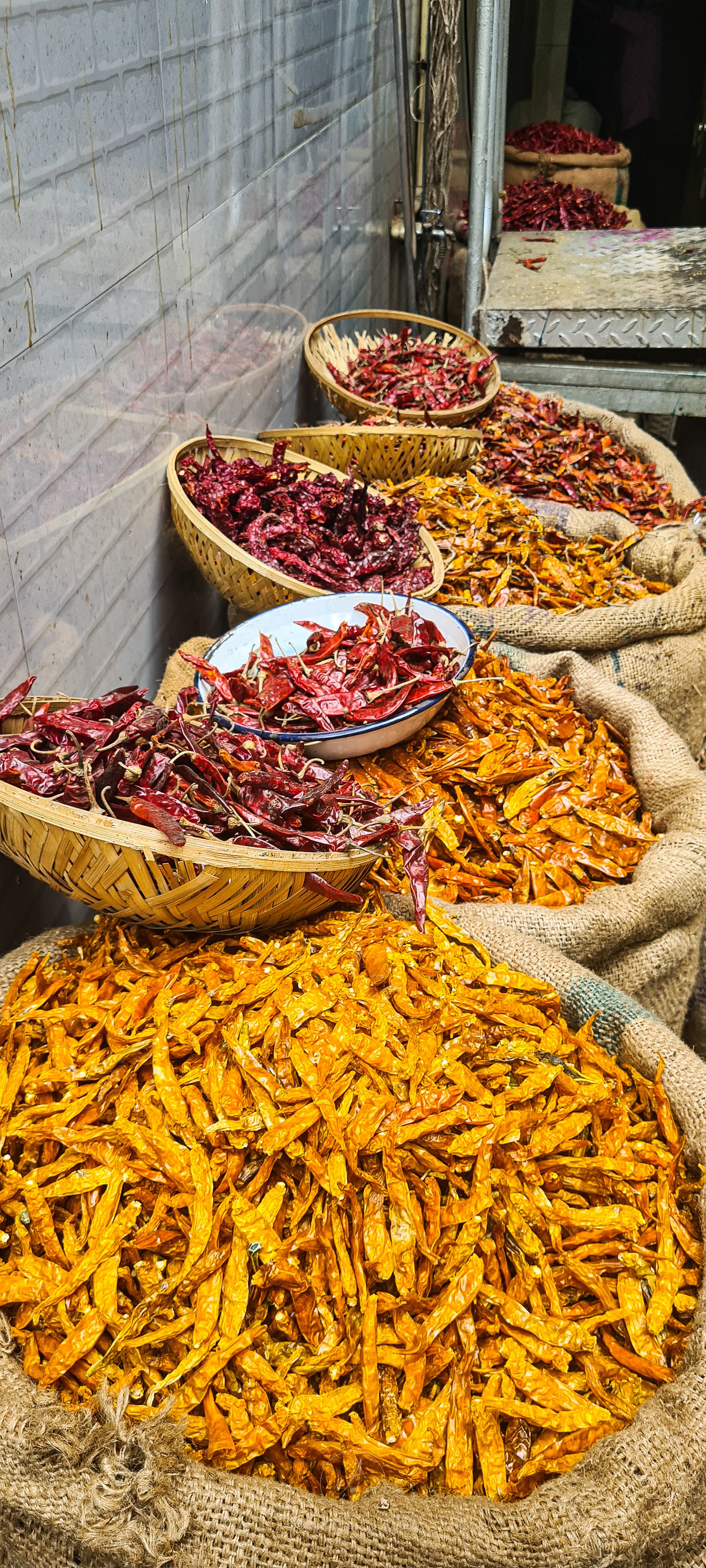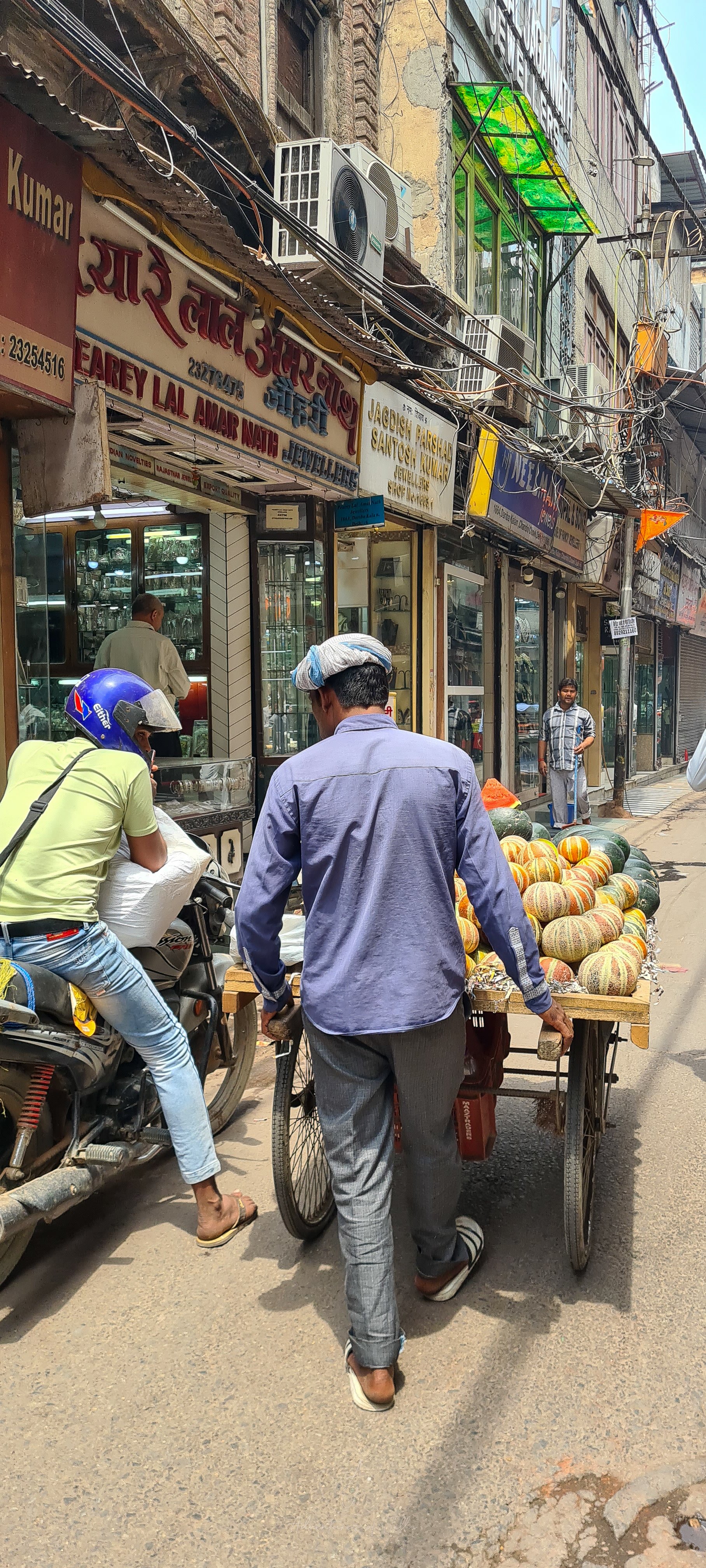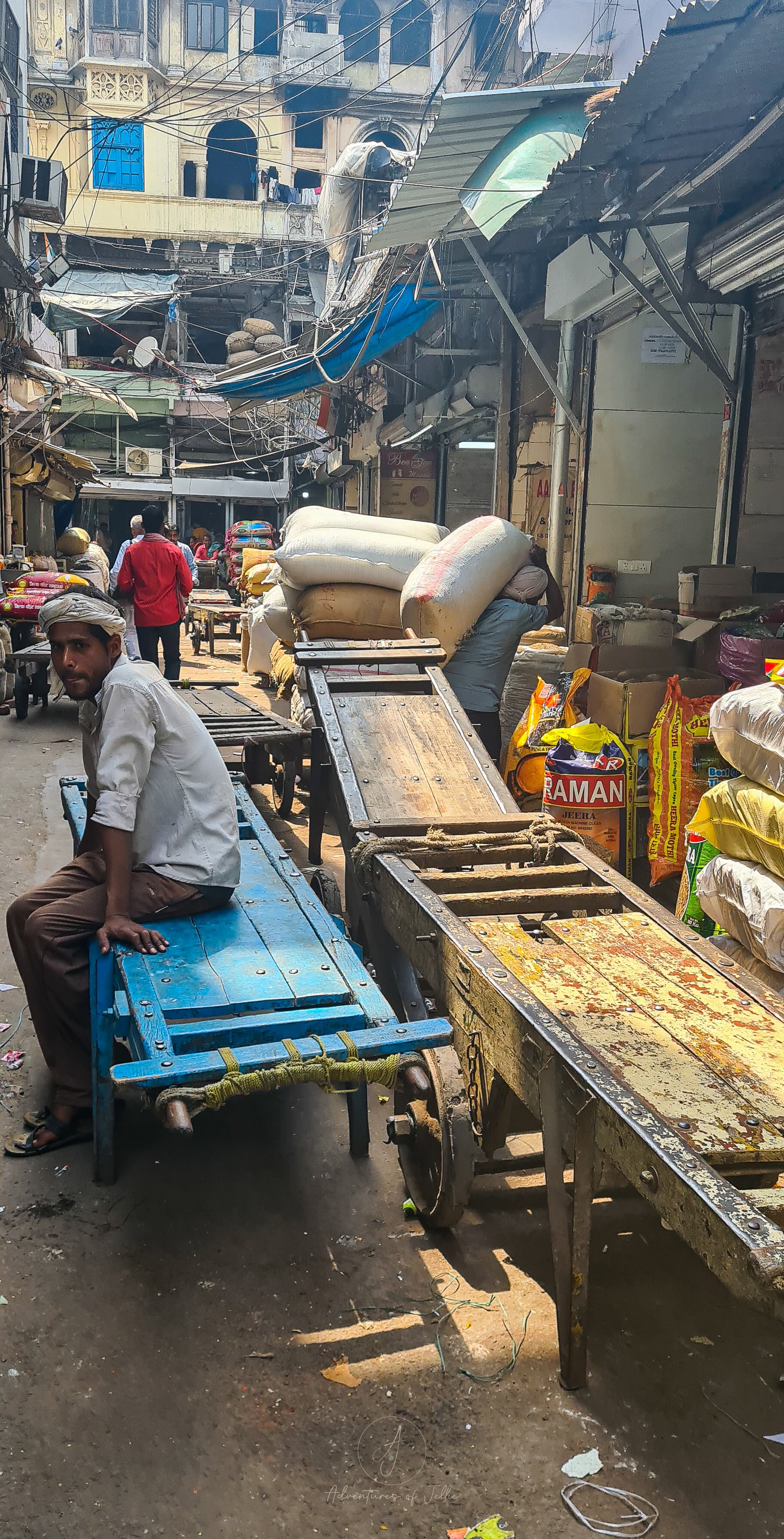Delectable Delhi - The Best Food Tour of India’s Capital
Disclosure: This article contains affiliate links. We will earn a small commission from any purchases made through these links.
We'd had an amazing time with A Chef’s Tour in Phuket Thailand and, after we had settled into the hectic pace of Delhi, decided that a food tour would be the perfect crash course into the street food scene of India’s busy capital.
Street food in India, especially Delhi has a mixed reputation, on one hand everyone acknowledges the incredible depth and range of flavours. On the other hand….Delhi Belly… We wanted an introduction to the best of Delhi’s street food but also wanted a little reassurance. A Chef’s Tour seemed a perfect way to boost our confidence and reignite our street food savviness.
We booked our tickets and were scheduled to meet at Lal Quila metro station at 12 noon. We arrived early and after barely a moment of awkward loitering, we were greeted from behind with a "you need wait no longer!". Our guide Gajendra had arrived.
We were lucky, as it turned out that it was just the two of us booked on the tour that day, so we effectively had a private food tour of Chandni Chowk market!
Gajendra was brilliant from the moment we set off to the end of the tour. He was approachable and incredibly knowledgeable and had some sort of supernatural ability to dodge and weave between the crowds in the busy market streets.
We were hungry and eager for Indian street eats. So, with our expert guide leading the way, we set off into the hectic crowded streets of Chandni Chowk market.
Food Stop Number 1 - Jalebi
Let's get the party started!
Walking away from the station the motorised traffic disappeared and was replaced by the constant call of the pedal powered rickshaw. Chandni Chowk's main street is closed during the day to cars and bikes but cycle rickshaws have taken their place in droves. You can barely take a step without an offer of a ride.
Through the throngs of people we made our way to the “Old Famous Jalebi Wala”. Set on the corner of the main street and a maze of side alley markets, this historic stall has been serving up sweet jalebi and other fried snacks since 1884. Our guide dived into the crowded shop and reemerged carrying two of the bright orange treats.
Jalebi are deep fried flour batter swirls soaked in sugar syrup. Think a super crispy donut concocted by a sugar obsessed desert maniac. They are super sweet, with a soft chewy centre and despite the syrup, a seriously crispy outside. They are also, unfortunately for our teeth, highly addictive! If you are in India and need a sugar rush these are available everywhere and are a very tasty treat. If you ever see them being cooked on the street, make sure you grab a hot fresh one as they’re even better then!
Stop at the Jain Jewellers Row
An unexpected oasis in the whirlwind of Chandni Chowk.
After our sweet starter we turned off the main road and into the labyrinth of markets that make up Chandni Chowk.
Chandni Chowk is not just one market, it is a collection of smaller, specialised markets that have grown together into one massive amoebas bazaar. Streets spiral into alleyways. Districts selling only the ribbon trim for wedding dresses butt up against areas specialising in specific shoes. It is a tangle of colours, smells and frenetic business. The market is also fantastically old. Built by the Mughal Emperor Shah Jahan (the same Shah Jahan who ordered the construction of the Taj Mahal) in the 17th century, Chandni Chowk was once one of the largest wholesale markets in the world.
This history is reflected in the market’s crowded streets, the old buildings having grown into, over and around one another over the centuries. The further you walk into its streets, the narrower the lanes get and our guide was taking us in deep!
Having dodged and been rattled around like a human pinball through the kaleidoscopic streets, we ducked through a heavy, ornately carved wooden doorway and found ourselves in an oasis of calm. Gajendra had brought us to the historic street of Jain jewellers. Beautifully decorated houses lined the small lane with brightly coloured doorways and fluttering flags strung between the houses. The noise and chaos of the crowds flowed by outside the wooden entrance to the street but did not come in, it was like we were standing on a riverbank next to a raging torrent. We caught our breath as Gajendra explained the history of the area before diving back into the streets beyond.
Food Stop Number 2 - Paratha and Lassi
The first of the Curries.
Continuing deeper into the market we quickly became lost, and placed all of our faith in Gajendra to steer us through. We wound down alleyways, though crowds and navigated around porters stacked with more goods than we thought a human could carry. Abruptly we arrived at our first savoury stop of the day, a famous paratha shop hidden in the depths of the wedding district.
Paratha is a fried bread dish where a filling is sandwiched between two thin layers of dough which are then fried on a tawa (a large shallow Indian pan). This particular shop sold every type of paratha imaginable. From savoury to sweet, chilli to banana you could pretty much order anything. We ordered a potato and a cauliflower paratha and were quickly presented with metal trays filled with vegetable curries, fried paratha, chutney and even a sweet treat! The paratha was wonderful, flaky and crispy but yet somehow still rich, it paired with the vegetable curries amazingly. The small shop was filled with lots of metal benches and it was clear to see why they were all crammed full of people.
Whilst we were munching on our delicious paratha our guide offered us some lassi from the neighbouring stall. Lassi is a yogurt based drink that can be served sweet, salted or mixed with fruit (mango lassi is especially yummy). Lassi is often claimed to be good for digestion and seeing as this was only food stop number two of our tour, we felt we could use all the help we could get! Two sweet lassi appeared in metal cups and we quickly drank them down. Slightly thick, the yogurty drink was perfectly balanced between sweet and sour. You wouldn't think of yogurt as being refreshing but lassi is perfect in the crowded heat of Delhi.
Food Stop Number 3 - Pani Puri
A literal flavour explosion.
After our paratha stop we rejoined the crowds outside and made our way through the busy narrow lanes to our next foodie destination. On the corner of two alleyways, nestled in a small nook and surrounded by metal pots, sat a man. Walled in on all sides by tins of ingredients, kettles of curious liquid and a basket of crispy puri shells sat our vendor - the Pani Puri man.
Pani Puri is a street snack found all across India. Crispy spherical shells are lined with spiced potatoes, chickpeas or lentils and then filled with spiced water, chutney and, sometimes, yogurt. Pani Puri had been on our “must try” dish for India (much like Kaya Toast had been in Malaysia) and we were excited to try this popular snack.
Our excitement was turned to trepidation when we were presented with the filled product, as they were larger in person than we were expecting. Pani puri have to be eaten immediately and all in one go as soon as they are made or else they will dissolve and the spiced water will spill out.
We either have tiny mouths or are just not used to eating such big bites as the filling exploded through our mouths as soon as we bit in. It is hard to describe, we have never eaten anything like the pani puri. As soon as you crunch down, waves of flavour assault your senses. The water flows out (and on our first attempt goes straight up our noses), and fills you full of its curious spicy flavour. The crunchy casing gives way and the soft potato / lentil filling mixes with the chutneys and sauces and takes over your mouth. The temperature of the experience is also very unexpected! Lukewarm to cool, the spicy water comes as a shock as soon as you bite down.
On top of all of this, as soon as you take your first pani puri, the vendor begins construction on your second, and third and forth….
After the shock of the first bite we can definitely see how these confusing flavour bombs can become an addiction. We have been thinking about them ever since!
Food Stop Number 4 - Kachori
Heavy deliciousness.
Around the corner from the pani puri salesman was a stall crowded with people. Once again Gajendra dived in for us and came back holding two steaming plates.
Kachori is a deep fried dough, crispy, hearty and more than a little greasy. The stall we were at served the kachori smashed up on the bottom of a spicy vegetable gravy and topped with chutneys and yogurt. Despite the small size of the plate, this was one of the day's densest and heaviest stops. The flaky deep fried dough soaked up the spicy gravy and sweet chutneys making for a thick stew of flavour. The sour yogurt cutting through the dense flavours and giving a welcome contrast in each bite.
Food Stop Number 5 - Butter Paneer Roti and Naan
Rich and heavenly, how much are we eating today?
After our rich kachori we moved out of the labyrinth and back on to the main road of Chandni Chowk. Amidst a semicircular arcade of shops and opposite the Delhi town hall, sits an unassuming staircase. Wondering quite where Gajendra was taking us, we wandered up the stairs and emerged into the smells of baking naan breads. Unsure how we were going to fit any more food in, we sat at a little table and looked on in disbelief as Gajendra ordered two breads each alongside a large butter paneer curry!
Butter Paneer, is now one of our favourite Indian dishes, if not one of our favourite dishes in the world. Being from the UK we are familiar with butter curries (specifically butter chicken), or at least we thought we were… Where the UK curries are sweet and artificially orange, often swimming in a separated layer of grease, the paneer curry was subtle, rich and beautifully smooth in texture. We haven't eaten much paneer before coming to India but have now become addicted to this firm yet light cheese. In the butter curry the paneer gave a light contrast to the nutty delicately sweet and rich gravy.
If the butter curry wasn't quite luxurious enough we had the breads to eat alongside. Tandoori baked naan bread with crunchy exterior and soft fluffy interior made an excellent dipping tool. Charred and bubbled from the tandoor oven, the naan manages the contradictory feat of being moreishly light yet satisfyingly dense.
The butter roti, is a thinner dough that is stretched and cooked on a tawa then brushed in clarified butter (ghee). The ghee adding another layer of richness to the crunchy roti. The roti also had the advantage of, when correctly folded, making for a deliciously decadent spoon to shovel the curry into our mouths.
When on a food tour it is always important to pace yourselves, you do not have to finish every meal and need to realise that there is more food to fit in later. Our brains, however, rejected this information and we gorged ourselves happily finishing all the curry and breads.
Food Stop Number 6 - Lime Soda
Much needed refreshment.
Now fully resigned to our gluttony, the next stop came as a welcome relief, it was to be a drink.
We had, in fact, had a lime soda the morning of our food tour and….well… we had not enjoyed it. When we had taken our first sip we had had our tastes bombarded with an eggy, deeply sulphurous taste. Luckily for us, this time tasting the soda we had Gajendra.
Gajendra explained that as a traditional aid to digestion, the sodas are often topped with a masala of spices including a black sulphurous salt. It was this strong black salt that had given us the mornings unpleasant surprise. Despite probably needing an aid to digestion we opted not to have the eggy addition this time and Gajendra ordered us two lime soda’s minus the sulphurous additions.
This soda was exactly what was needed after many heavy meals, fizzy and refreshing without being too sweet. Trust restored in lime sodas and noting to have more in the future we moved on.
Spice Market Stop.
An assault on the nostrils!
At the western end of Chandni Chowk lies the largest spice market in the world. Housed in a beautiful old square courtyard the market is a chaotic confusion of hand carts, spice sacks, colourful piles of mysterious powders and, above all, smell. Even before you get into the market itself you can feel a tickle in your nostrils and, by the time you are in the middle of it, it is too late, sneezing and coughing are nearly inevitable as sacks of powdered spices as hauled around and fill the air with a haze of aromats.
The market is amazing, a fully working relic of a bygone time. The hand carts rush around much as they would have done a hundred years ago. We were guided up a set of dilapidated stairs set into one of the market’s corners. At the top of the stairs we were treated to a view over the market and could literally see the layers of history where the building had been decorated, renovated and changed over the years.
Food Stop Number 7 - Rabri
So full now.
Eyes and nostrils running, and feeling like we were in the middle of hay fever season, we exited the spice market and made our way down a nearby street for yet more food.
By this point we were full to bursting but our curiosity and greed kept us going. We stopped at a man holding a metal pan of what looked like a thick white set yogurt. Desert number 2 was here, it was time for rabri.
Rabri is in fact not a yogurt but a dish of boiled condensed milk mixed with jaggery (palm sugar) spices and chopped nuts. It had a unique texture, nothing like a yogurt but more like a thicker mousse or set custard. It was less sweet than you would expect from condensed milk and sugar. With the nuts and spices bringing a more savoury undertone to the dish.
Food Stop Number 8 - Chai
Who can say no to a cuppa?!
Past the rabri seller was a small shop sandwiched between clothes stalls doing a roaring trade. The pavement was crowded with people and the nearby bins were overflowing with small clay cups. It was time for tea.
Being from England we are quite fond of tea, we (not us personally) have historically gone to war or attempted to get entire nations addicted to heroin just to feed our tea lust. So we are quite familiar with tea, or at least we thought we were.
We have tried the Chai tea back at home and our trendy London shops really miss the mark when it comes to chai. The true Indian variant is less sweet and much richer in clove and cardamom spices. It is served lava hot and bubbling in the clay mug it is proffered in. Despite being nearly too hot to handle and a shortcut to a burnt tongue, it is nothing short of wonderful.
Stop at the Sikh Temple
A tranquil respite from the foodie onslaught.
Nearby to the tea seller, Gajendra suggested a stop at a historic Sikh temple. We removed our shoes, covered our hair and stepped inside. It was like a beautiful jewellery box full of gold and colour. We sat at the back whilst scriptures were read and those around us listened and prayed. Neither of us are remotely religious but the calm and serenity of the temple, obvious devotion of those present and almost hypnotic sound of the scripture was an amazing and tranquil experience. The busy city outside felt a million miles away.
Food Stop Number 9 - Dahi Vada
Please stop feeding me / “It’s only wafer thin”.
Exiting the temple back onto Chandni Chowk was like jumping back into a churning ocean, once more the calm was replaced by the hectic pace of the markets. We followed Gajendra as he expertly wove and dodged between the crowds and led us to our final stop of the day.
Gajendra led us to a shop that had been in business since 1940 and grabbed us two plates.
Dahi Vada is a dish of fried lentil balls soaked in a thick yogurt until they are nearly entirely sodden through. This sweet thick mess can then be topped by chutneys, chat or any manner of other ingredients. It was almost like the kachori we had had earlier in the day, but more sweet and sour. The yogurt soaked through like a sour gravy with a sweet sauce drizzled on top with a sprinkling of powdered masala. It was truly unique, but we were so full by this point that we could only manage a couple of spoonfuls!
After the dahi vada you could have pretty much just rolled us through the streets. We had eaten nine courses of food in under four hours and we were absolutely stuffed! Gajendra had guided us expertly though the maze of Chandni Chowk and brought us to places we would never have found on our own. Indian cuisine is the unofficial favourite food of the United Kingdom. We had naively thought that this would have prepared us for the food we were going to eat on this tour, but we were blown away by the unique flavours and diversity of dishes we had been presented with. We had feasted to our hearts content on delicious foods, with flavour combinations we never thought of before. Under Gajendra’s expert eye we had learnt about the food of Chandni Chowk, its origins, flavours and history of the stalls.
A food tour is often a great way to get introduced to a new city, and the ‘Chefs Tour’ had been an amazing insight to the delights of Delhi. We enjoyed ourselves so much that we even came back to Chandni Chowk a few days later and deliberately got ourselves lost looking for another paratha.
If you would like to book this tour (and we highly recommend that you do) in Delhi, click the button below!
Thanks for reading,
John & Ellie x
#adventuresofjellie
A Chef’s Tour offers amazing, unique food experiences in many countries and cities (we had an amazing time with them in Phuket). From Bangkok to Bogota, Chiang Mai to Kolkata they offer amazing food tours all across the globe. Check out the link below and look around their website to see where they can take you.
Old Delhi’s Chandni Chowk district is a fascinating labyrinth of small alleyways, lanes and ancient streets. Selling everything and anything, the narrow paths wind and turn as you get deeper and deeper into the old bazaar. As you spiral through, the paths get narrower as marketgoers and vendors vie for space in the tiny alleys.
The best way to explore this historic area of Old Delhi is to take any pathway, just keep walking and allow yourself to get lost in the melee of people. There is no right way to go, just go with the flow and enjoy the mesmerising spiral of vibrant colours, smells and sounds in this centuries old area of Old Delhi.
Here are some of our photos we took during our time exploring Chandni Chowk whilst on our food tour and a day later exploring on our own:
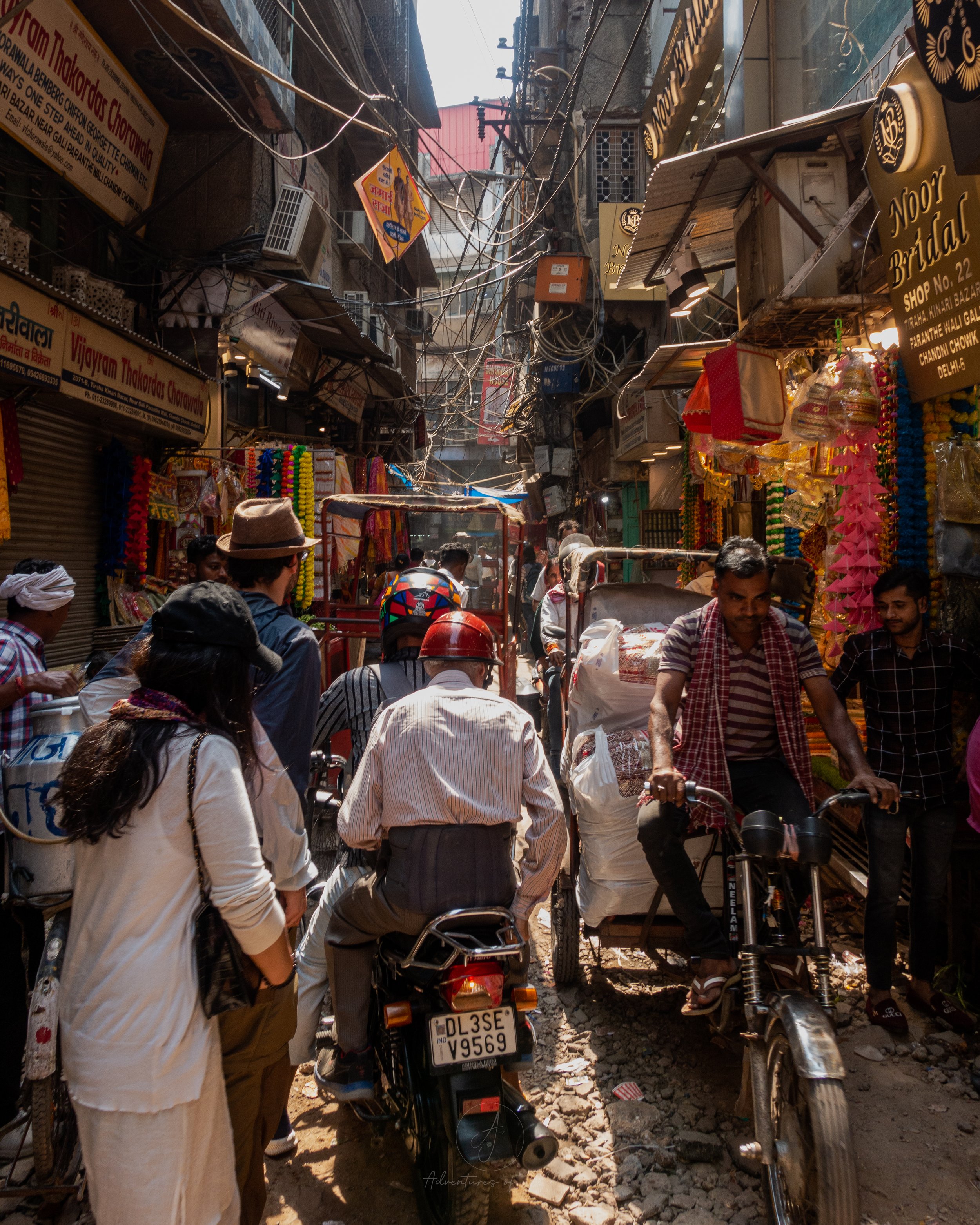
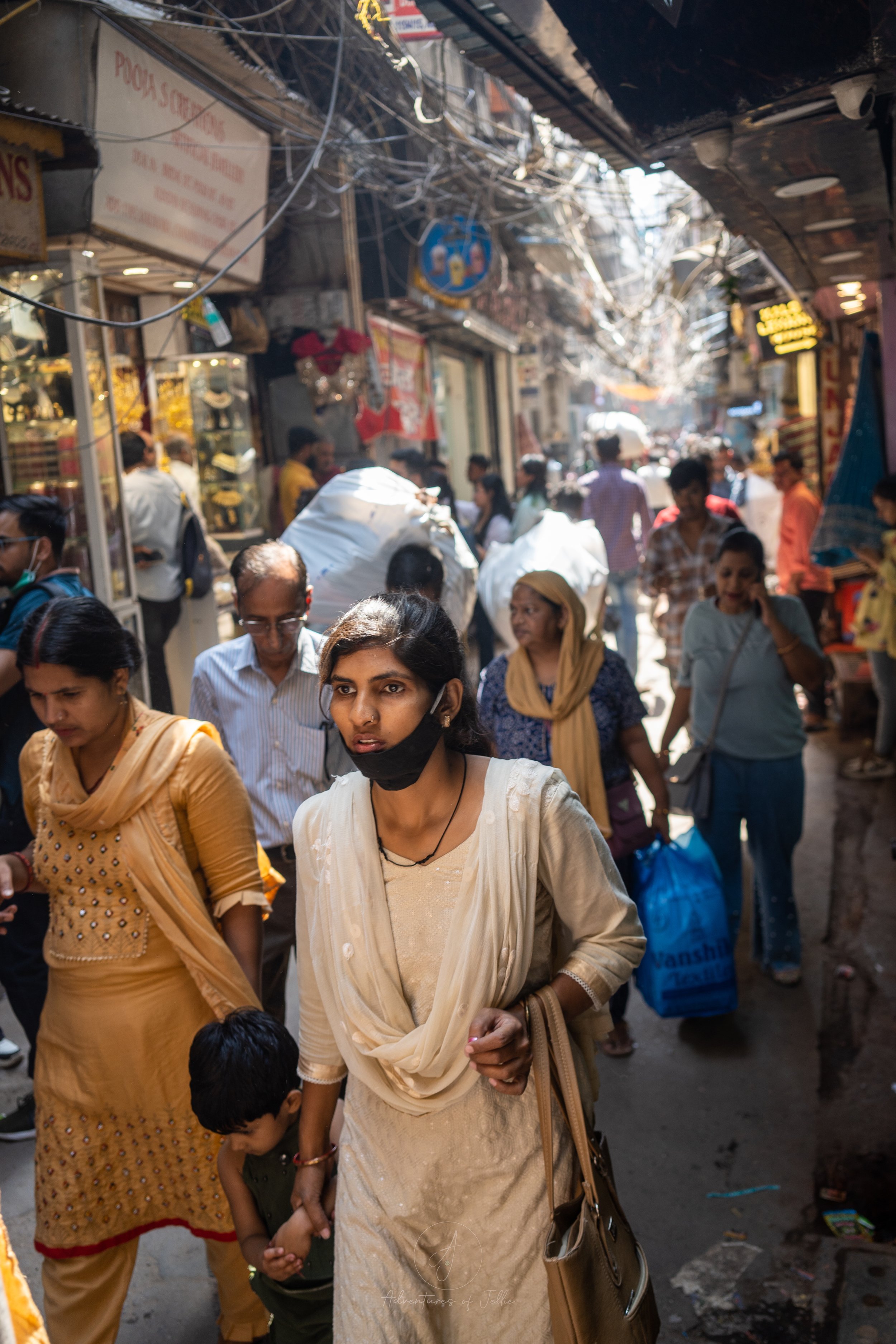
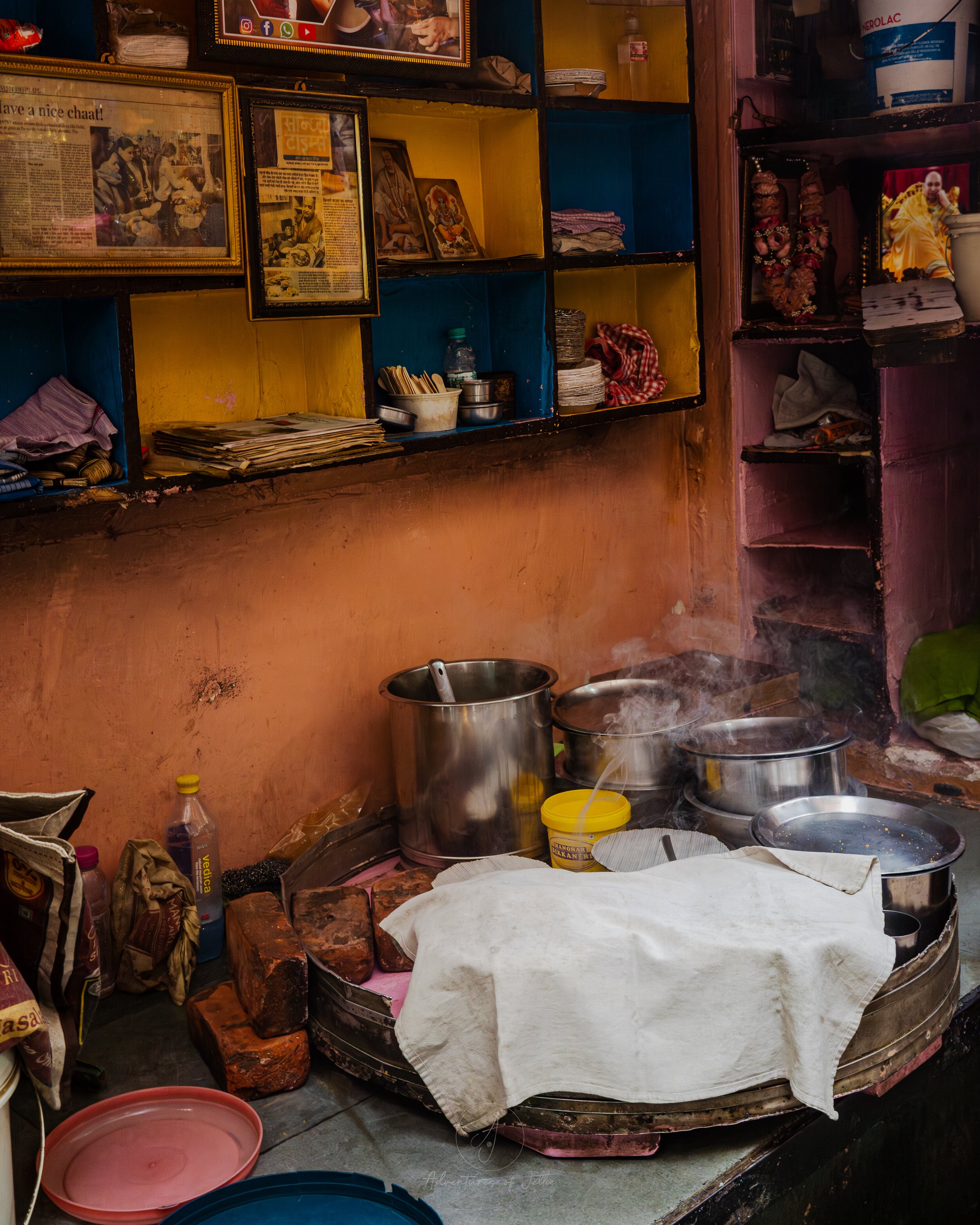
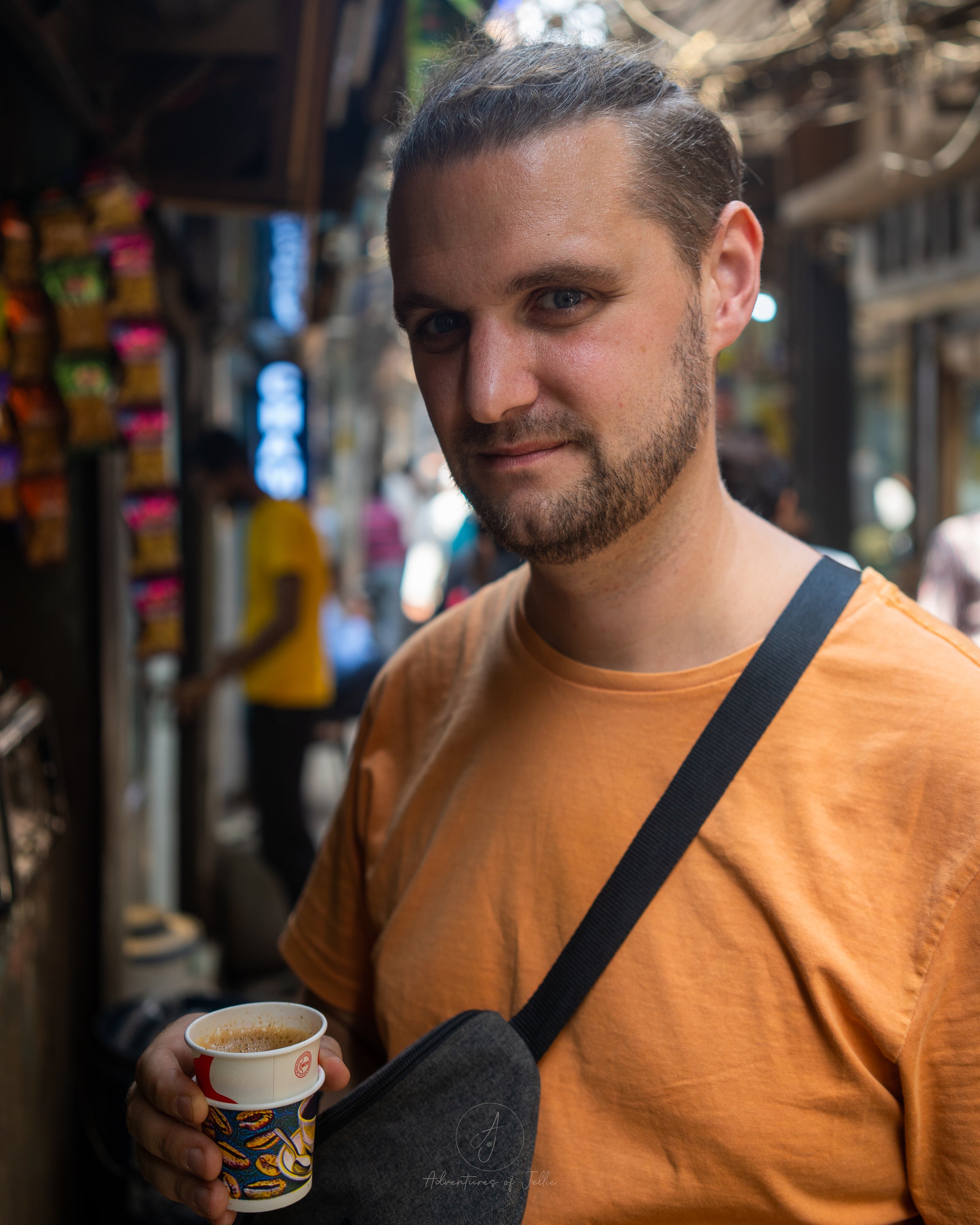
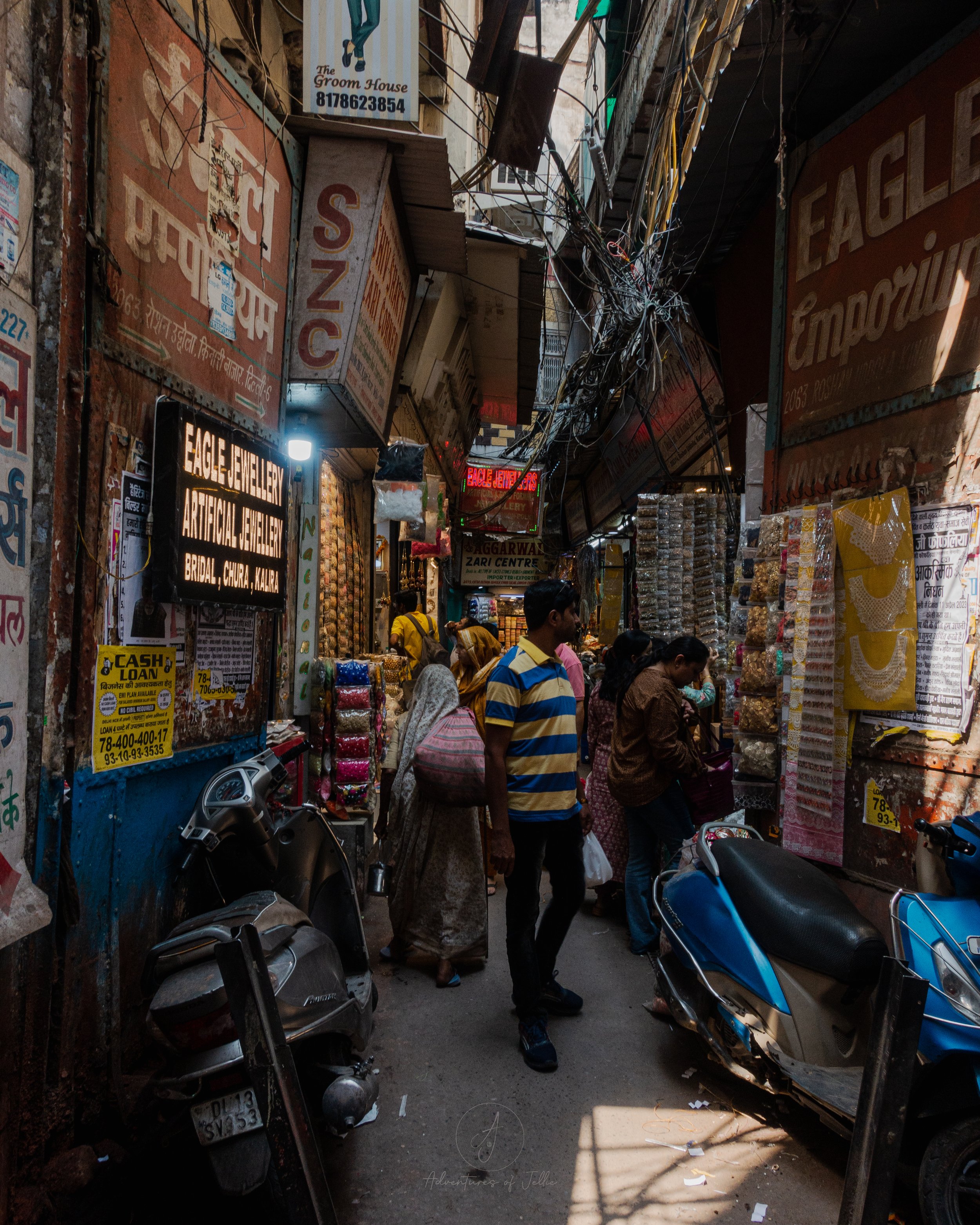
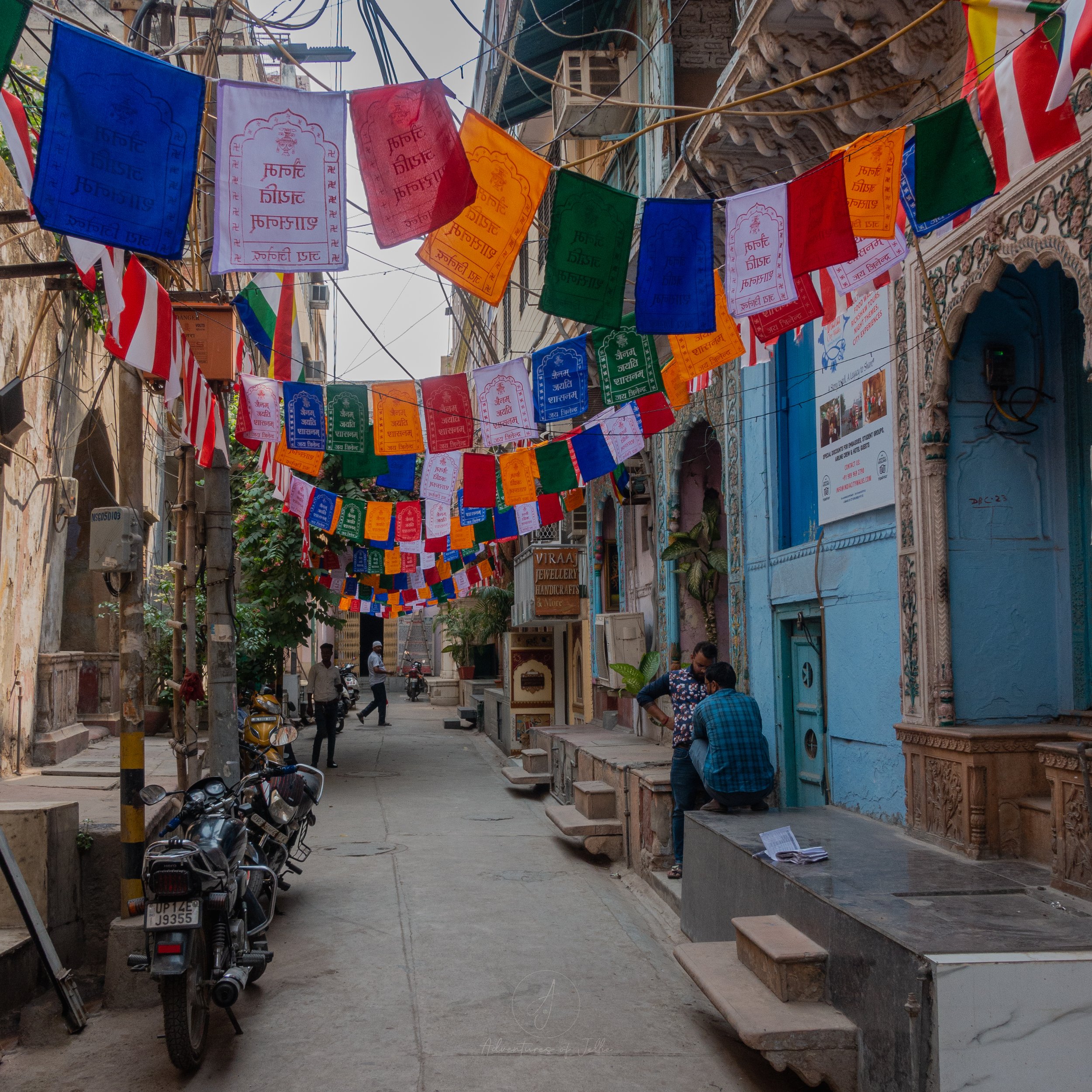
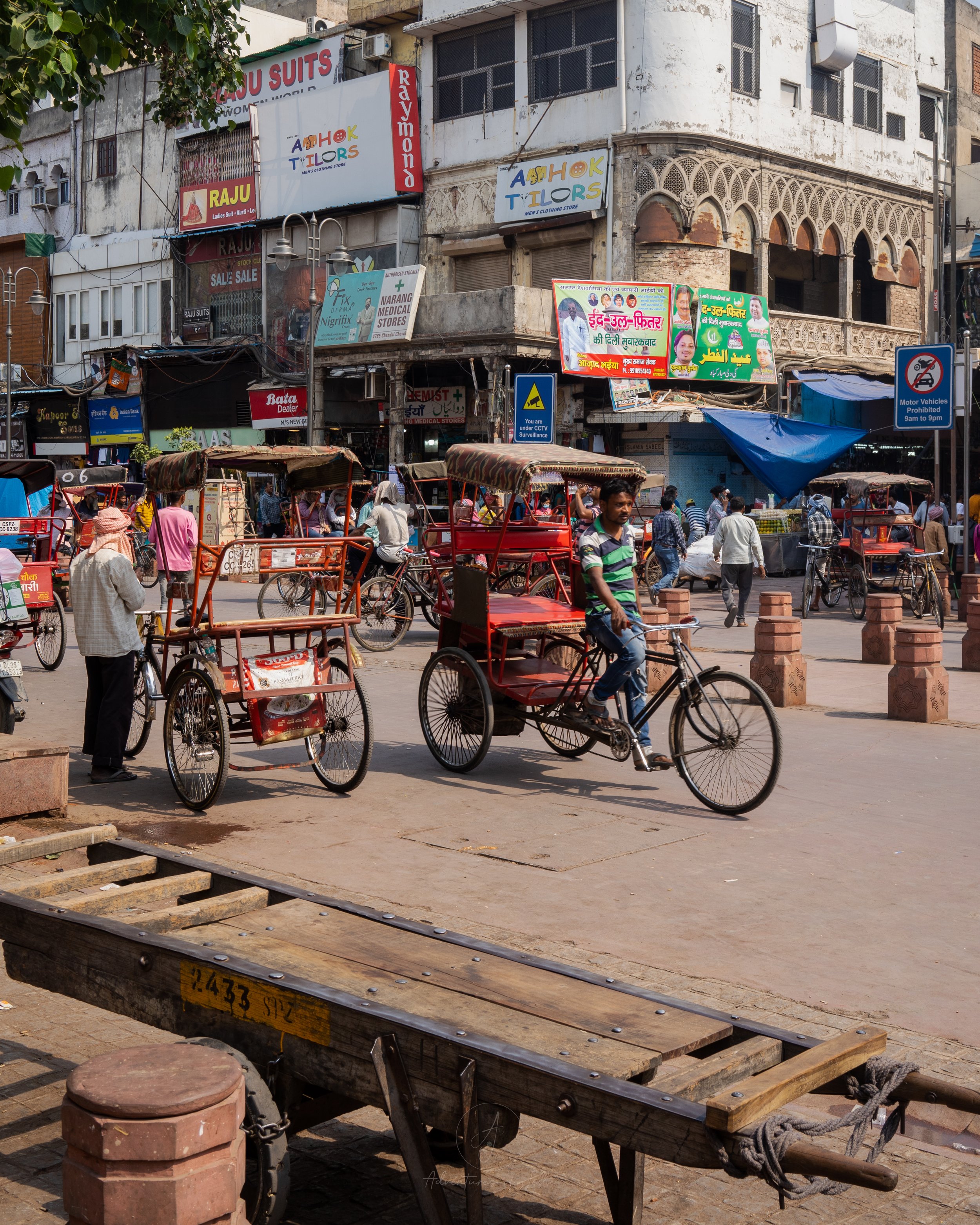
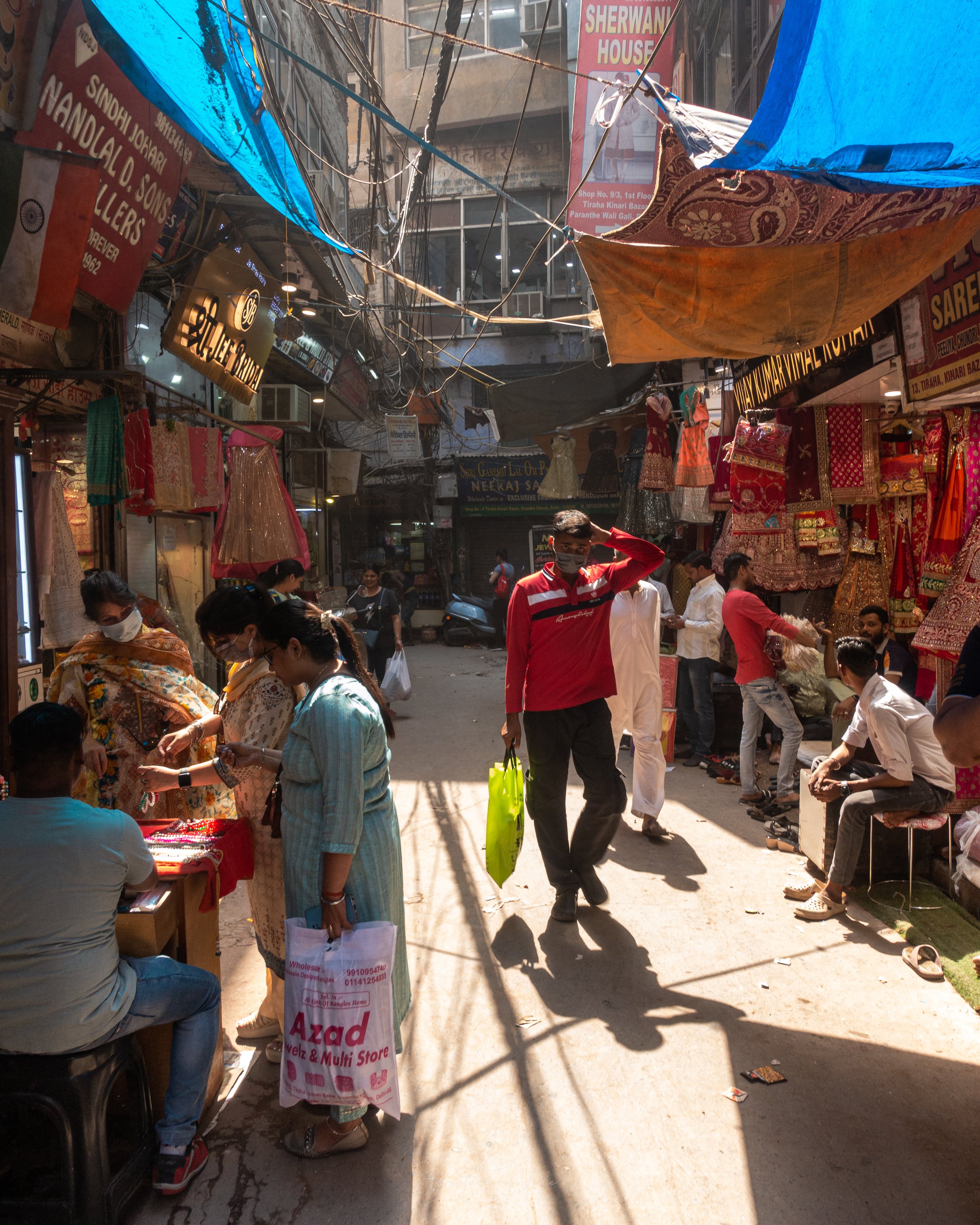
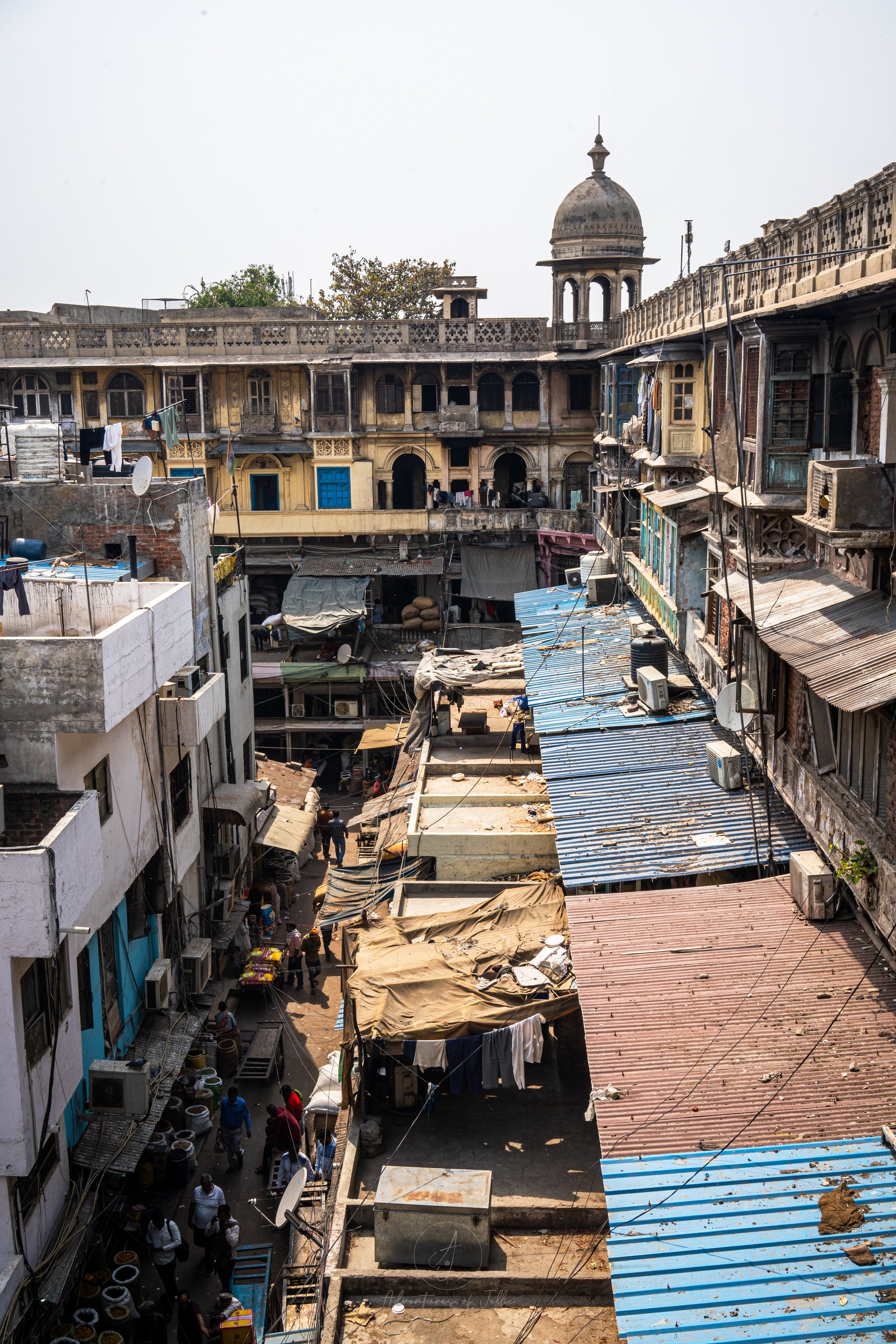
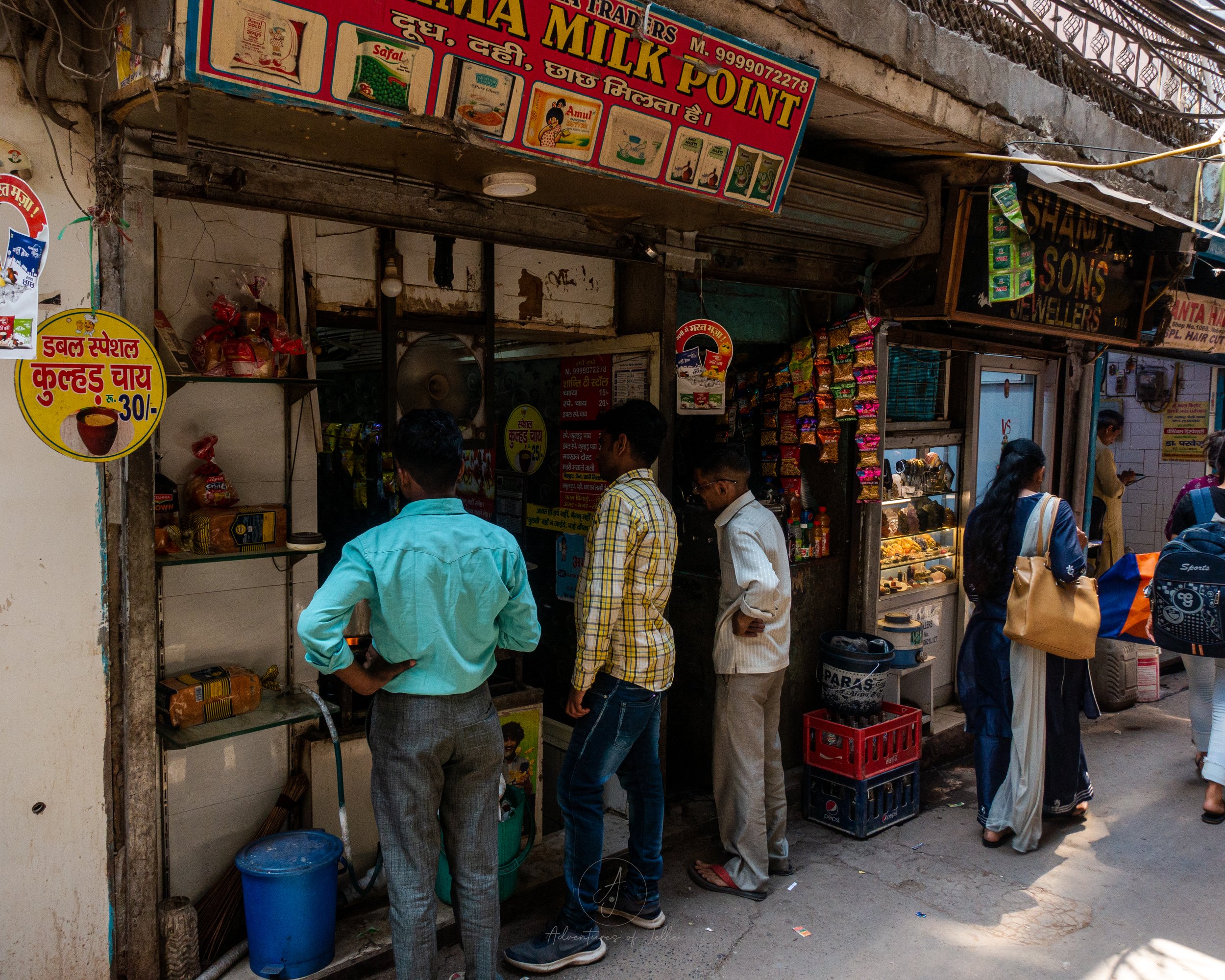
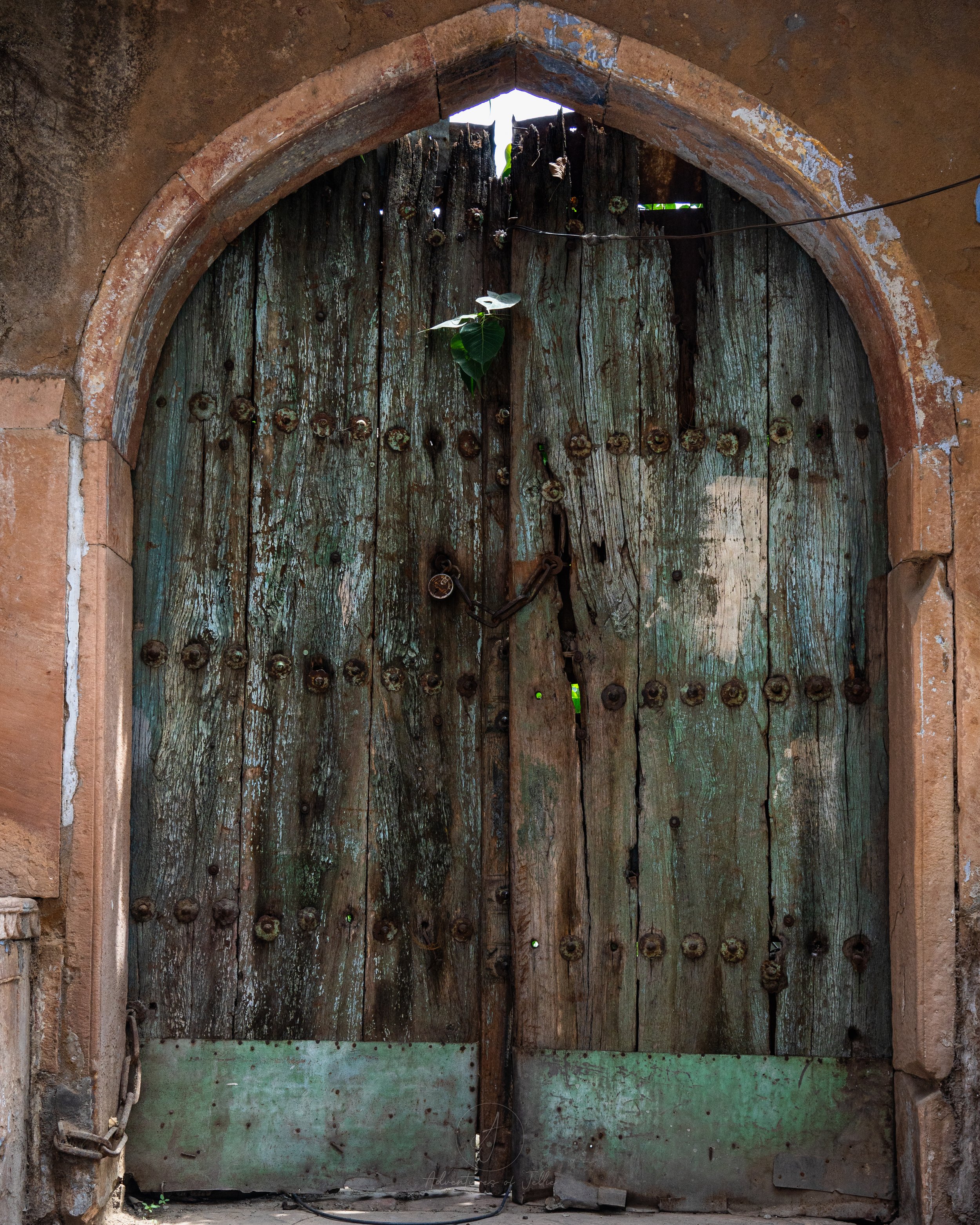
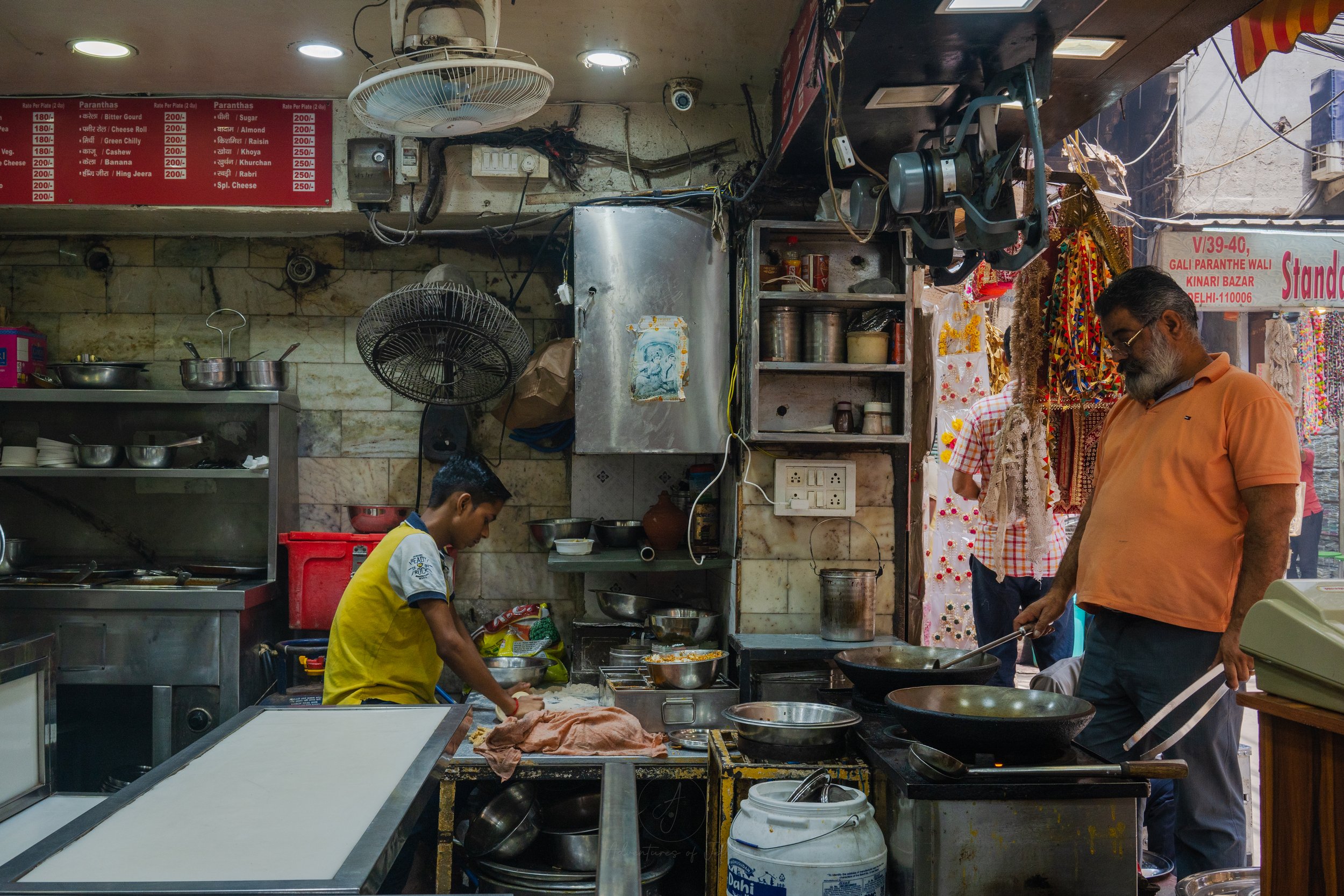
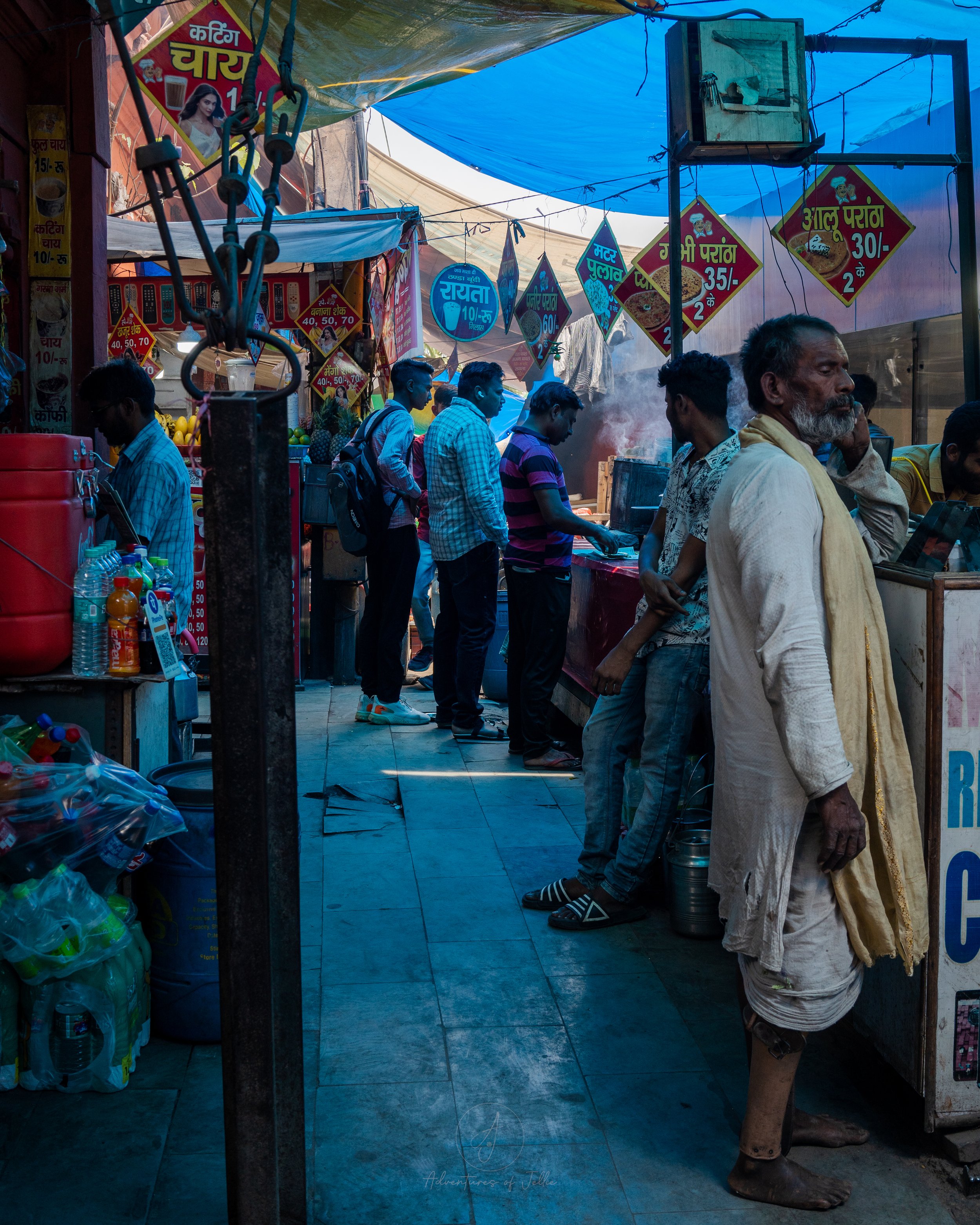
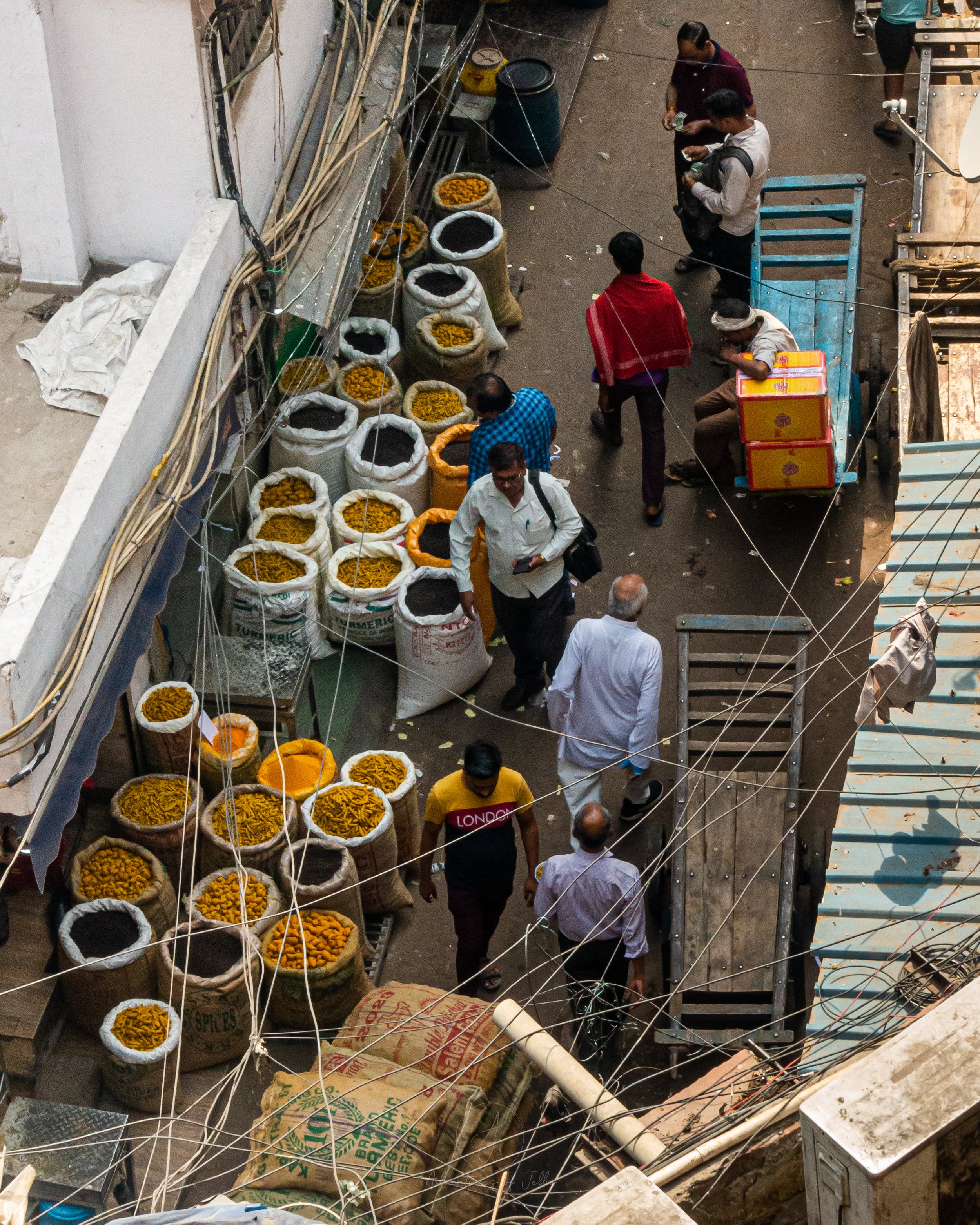
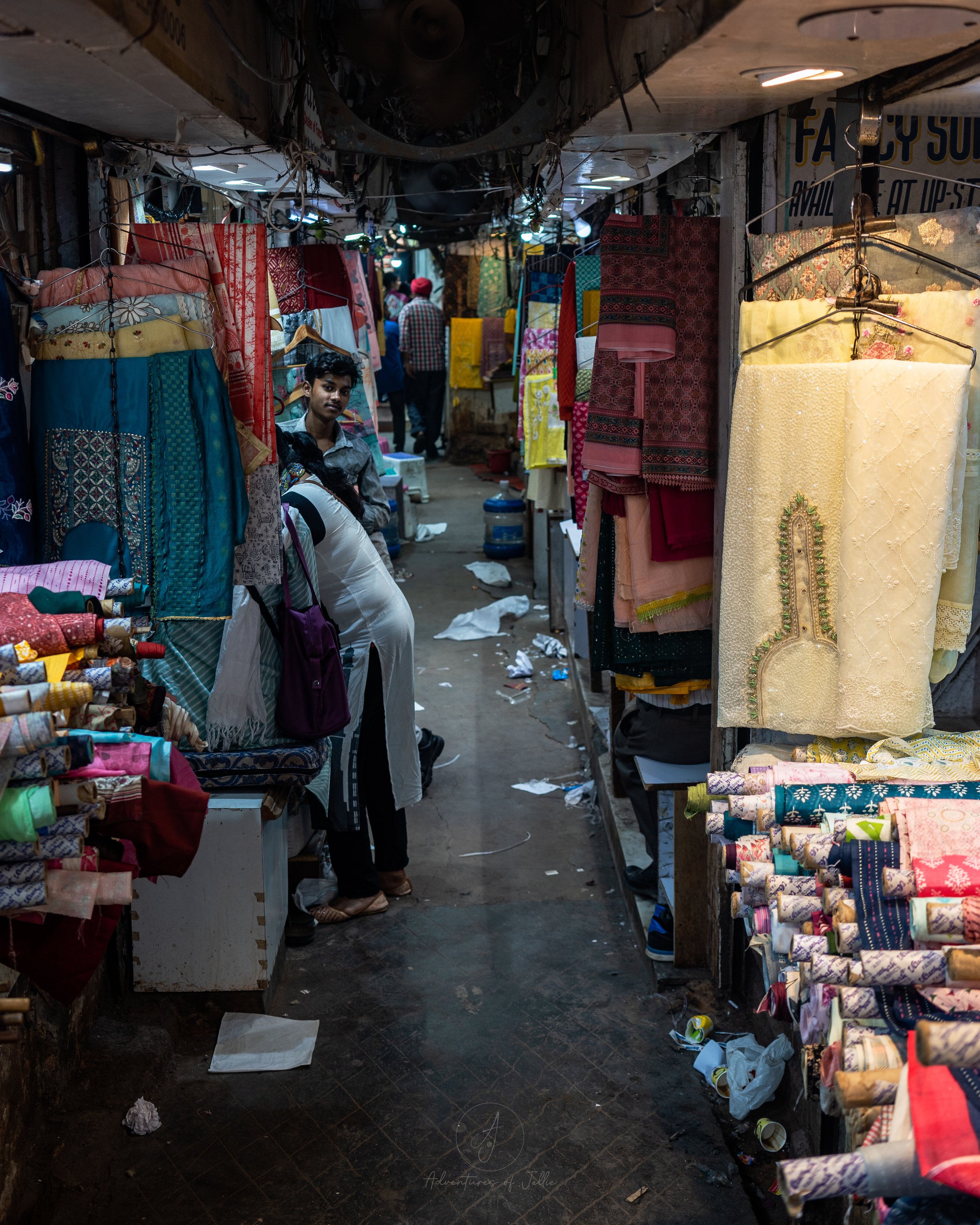
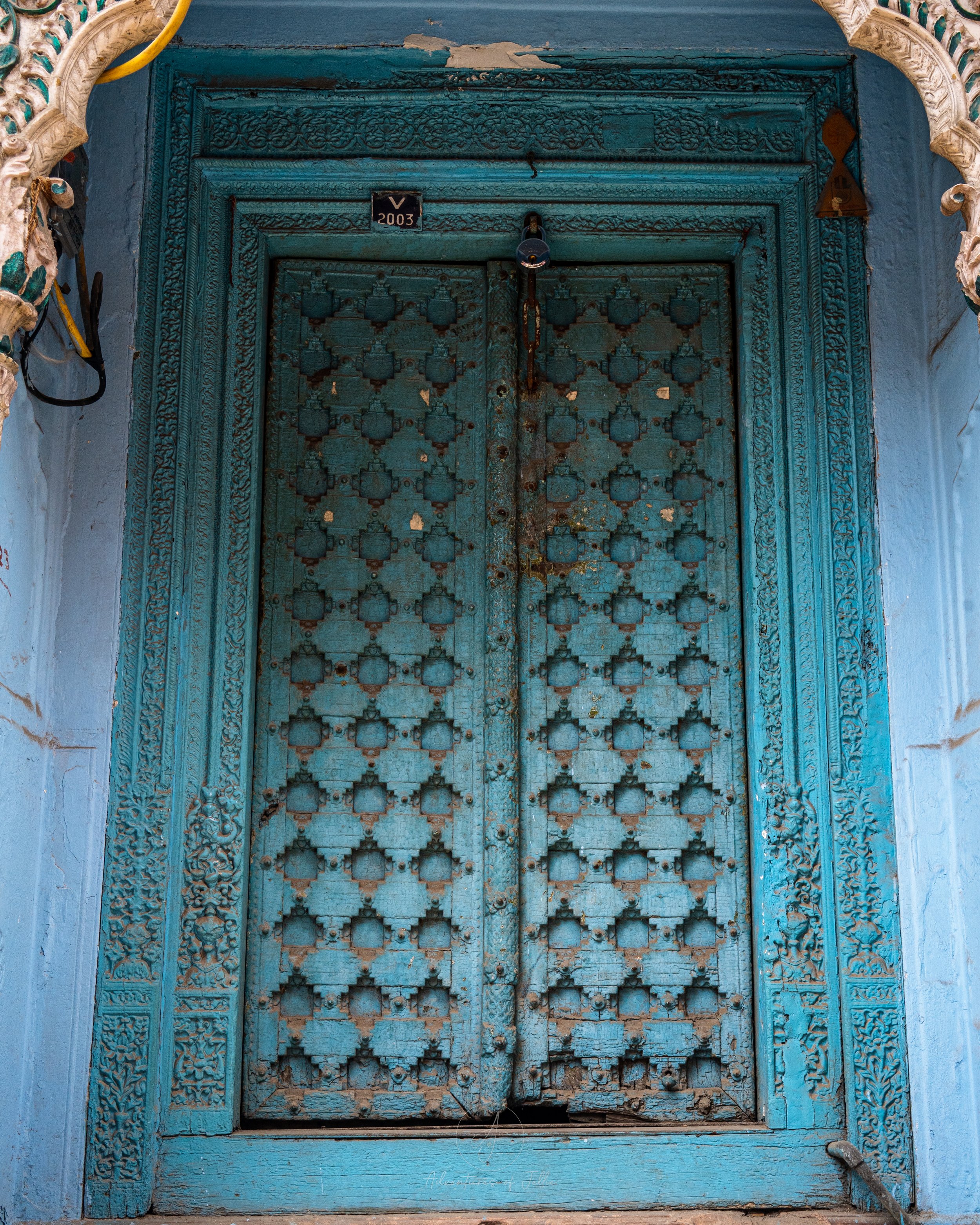
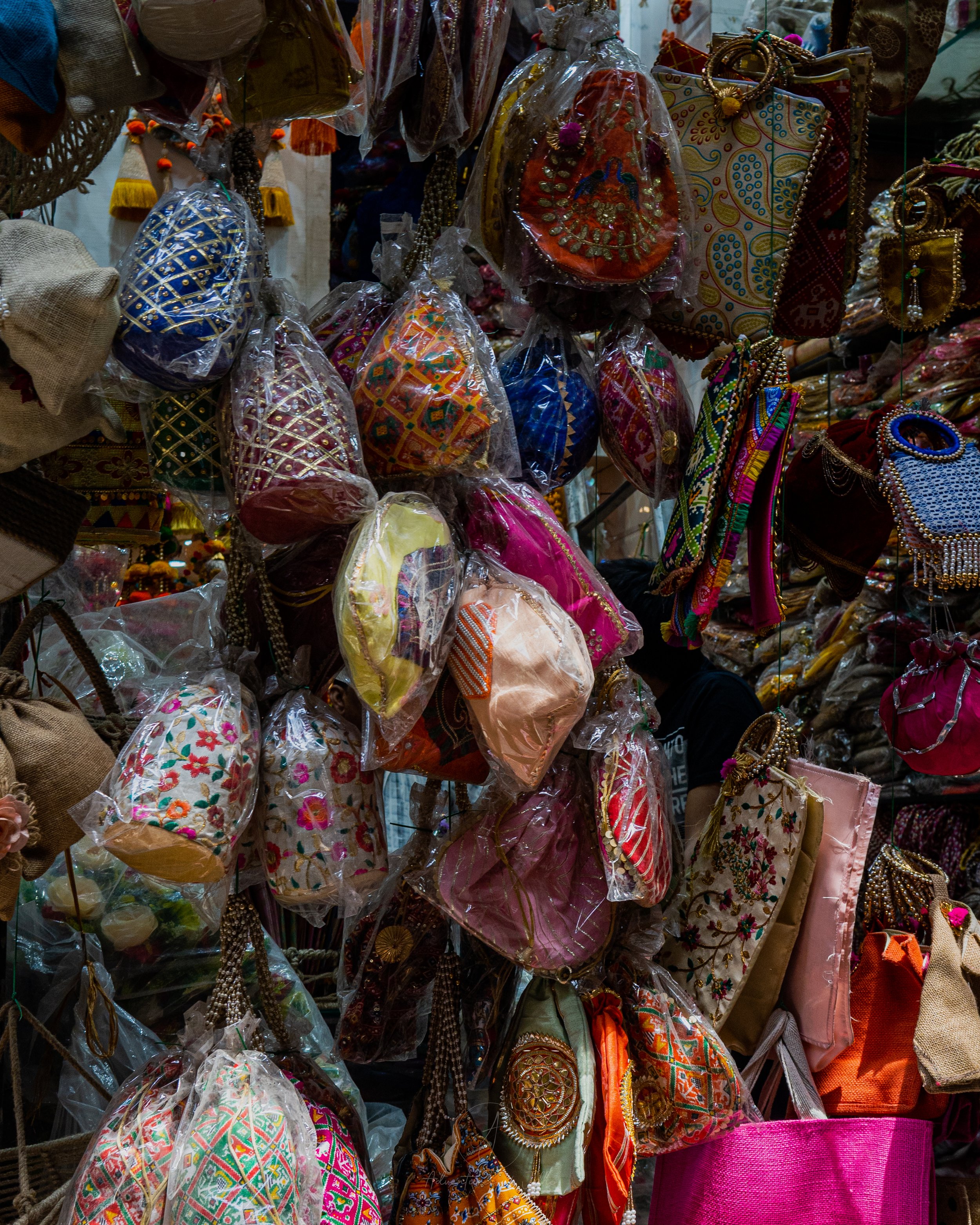
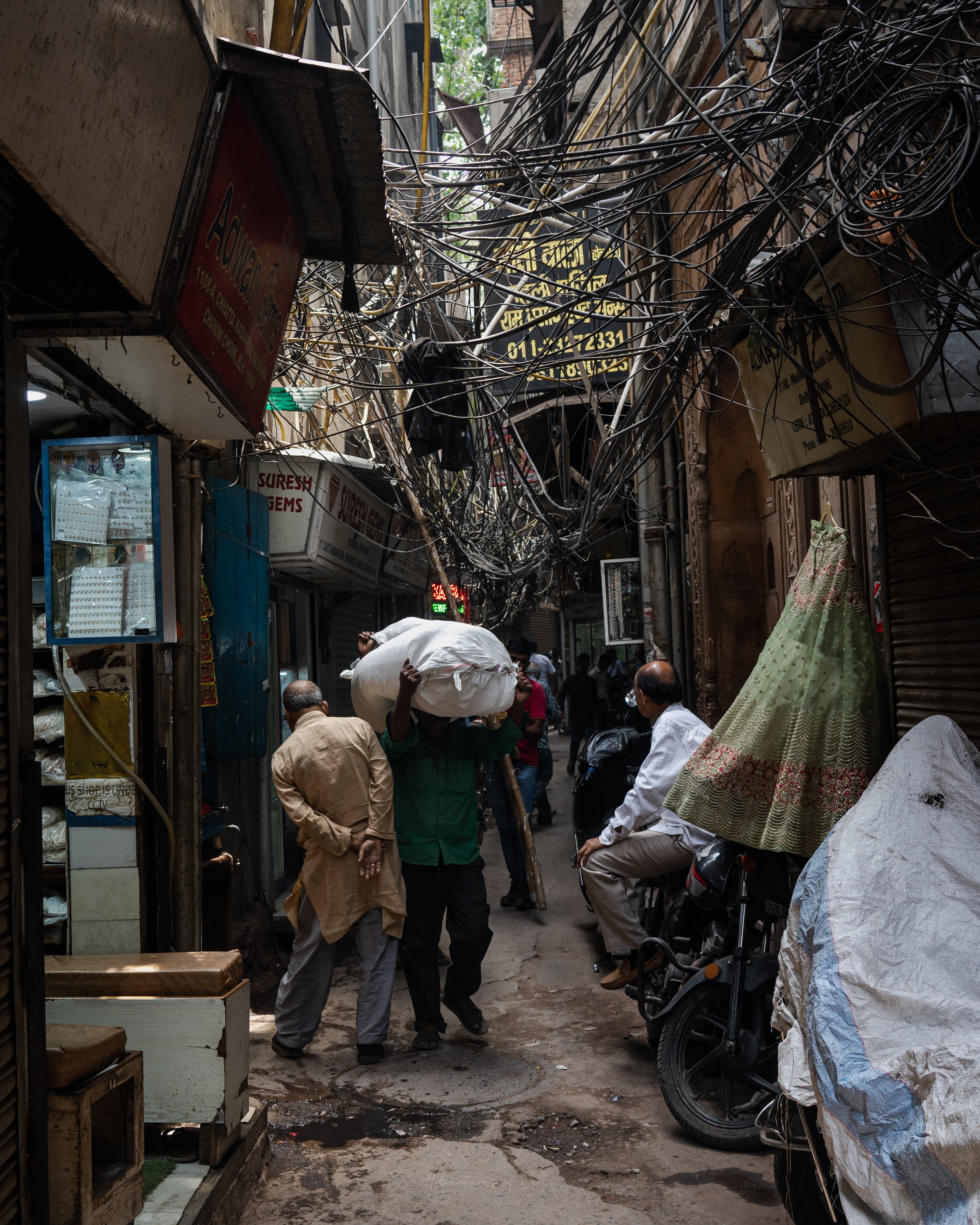
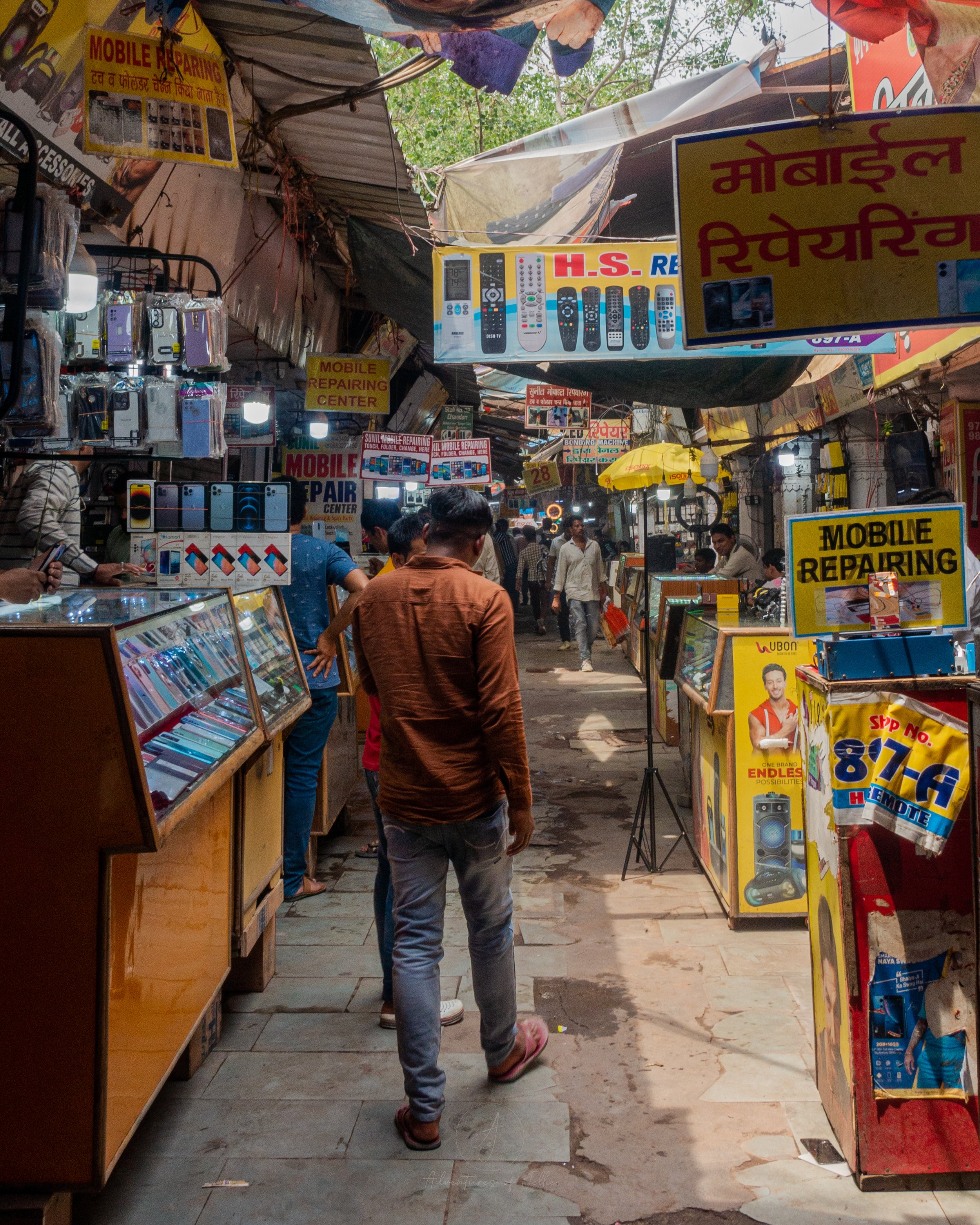
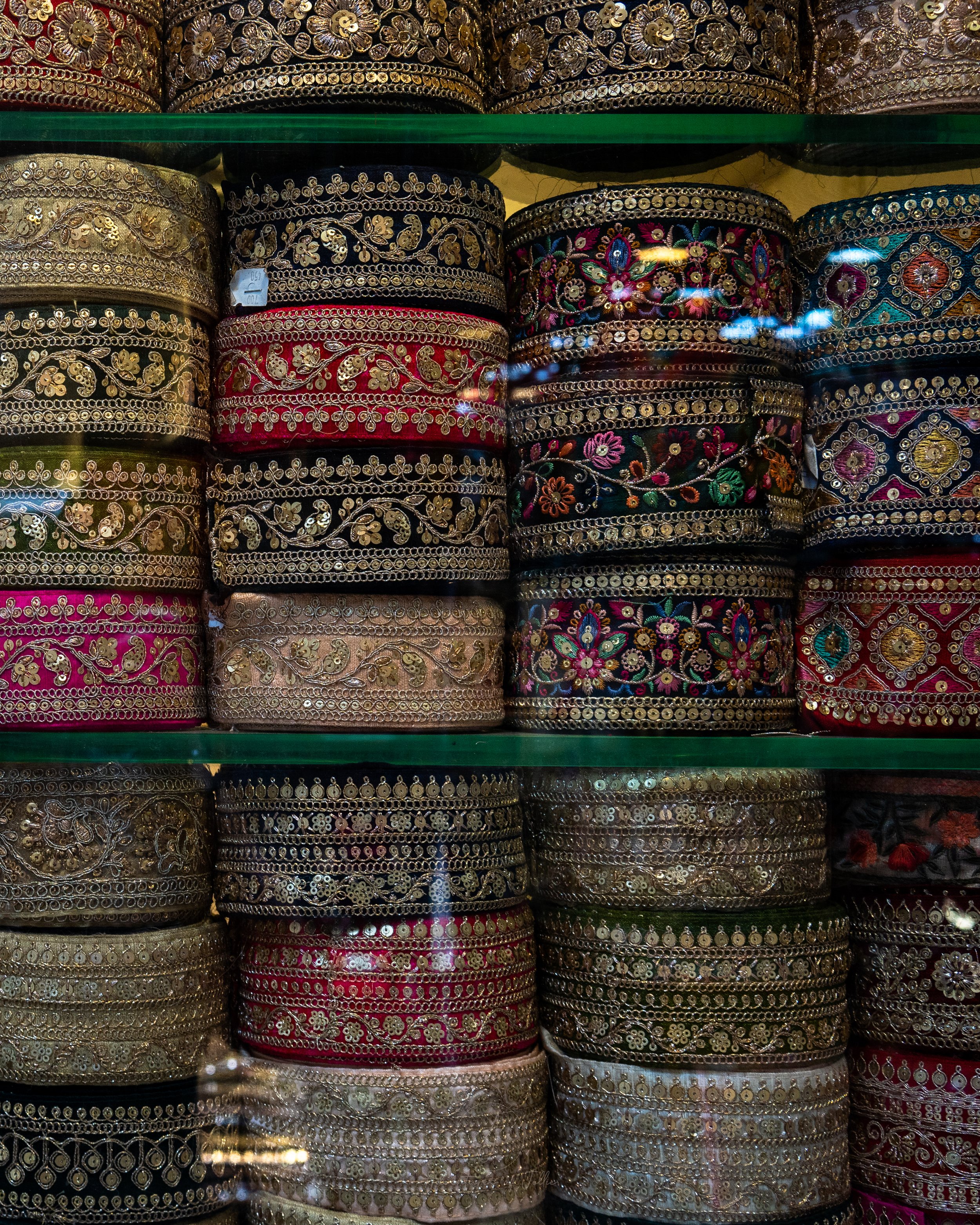
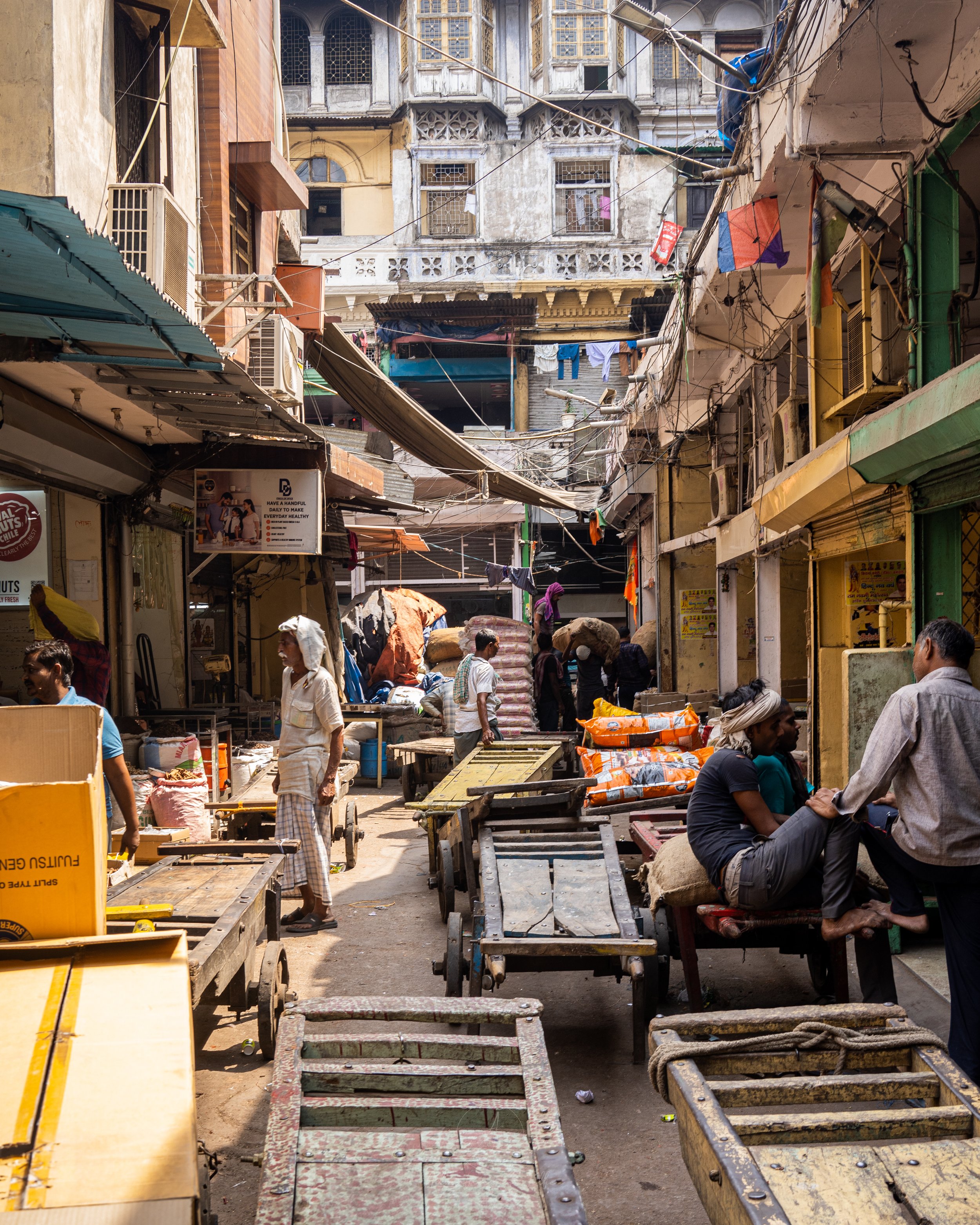
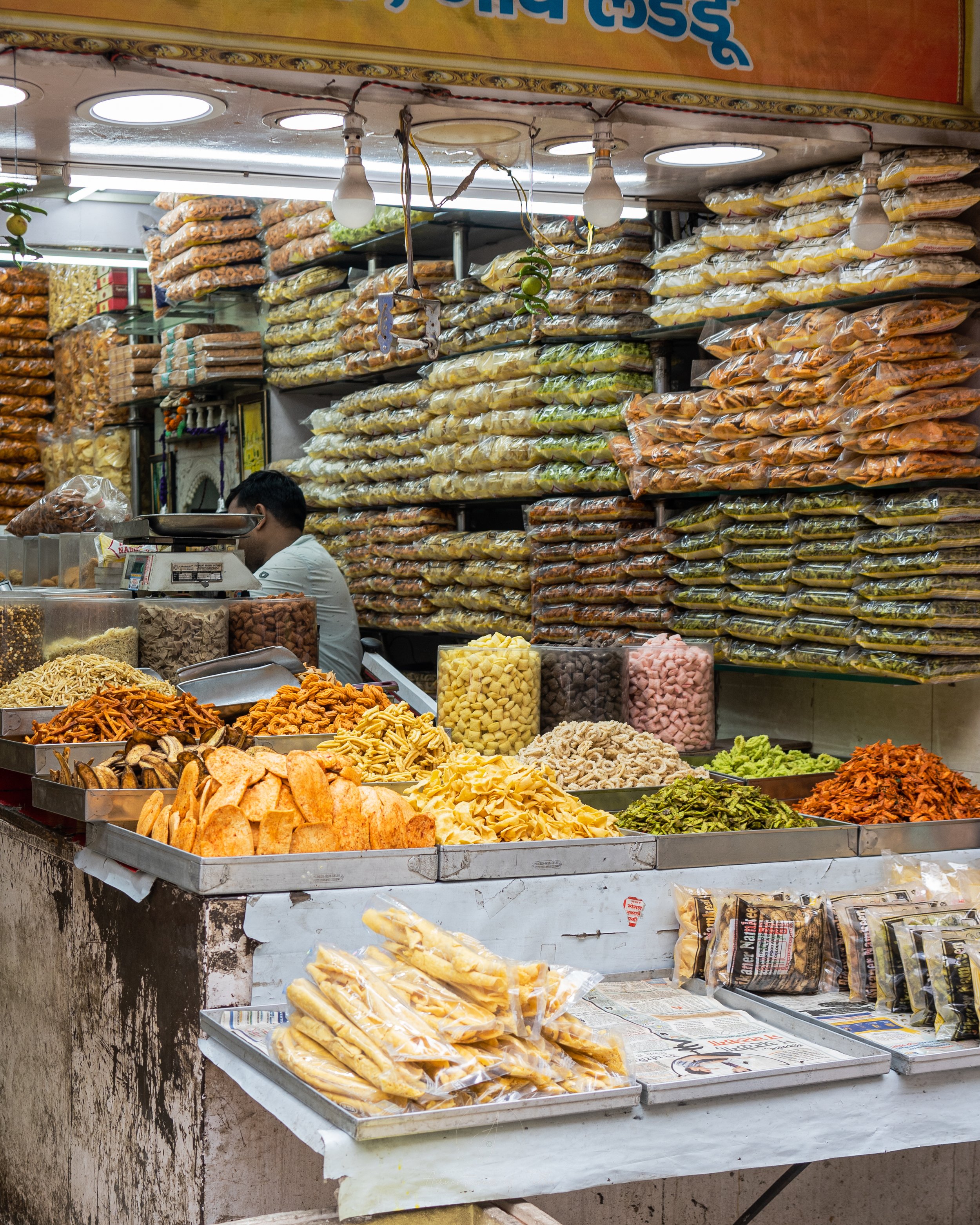
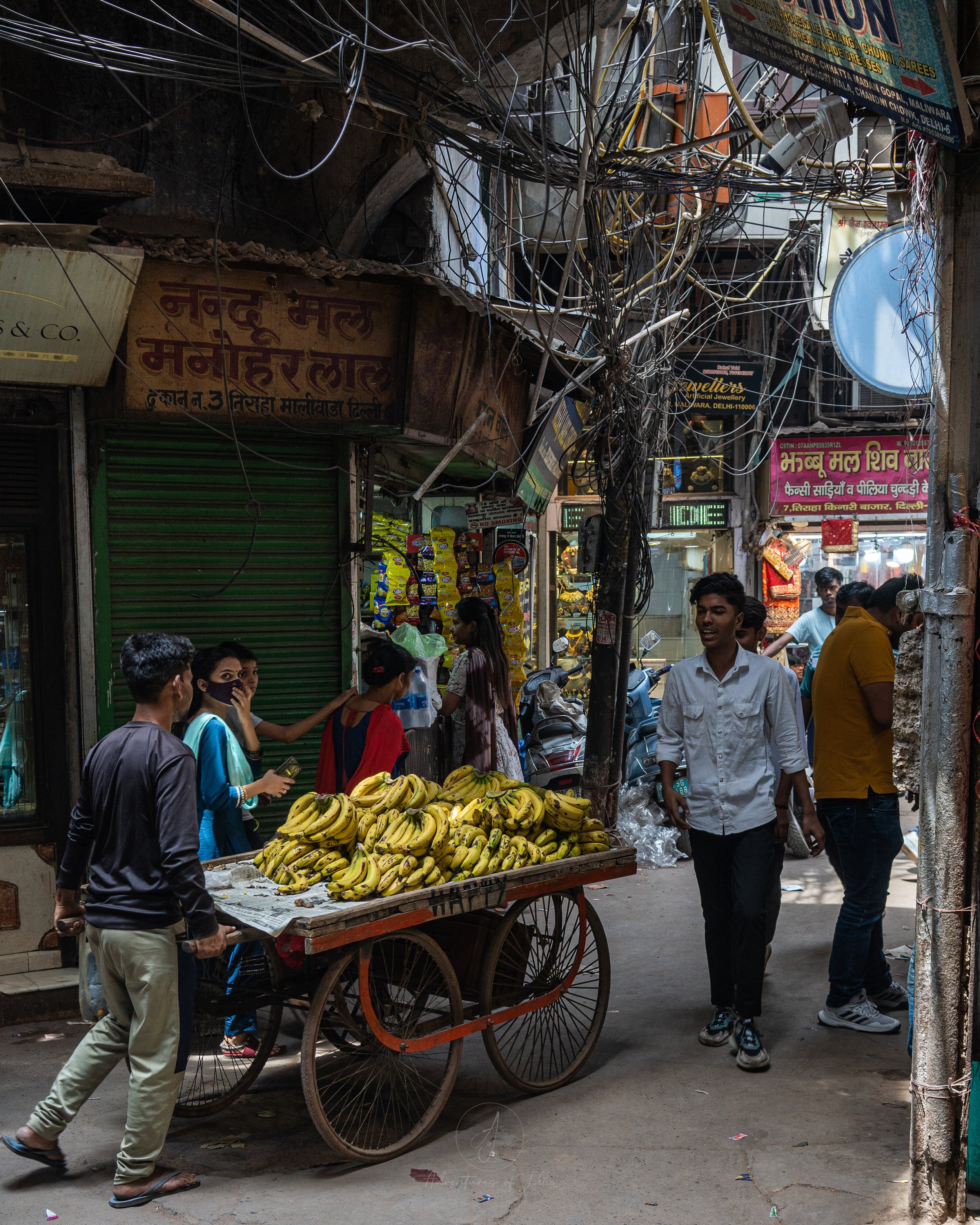
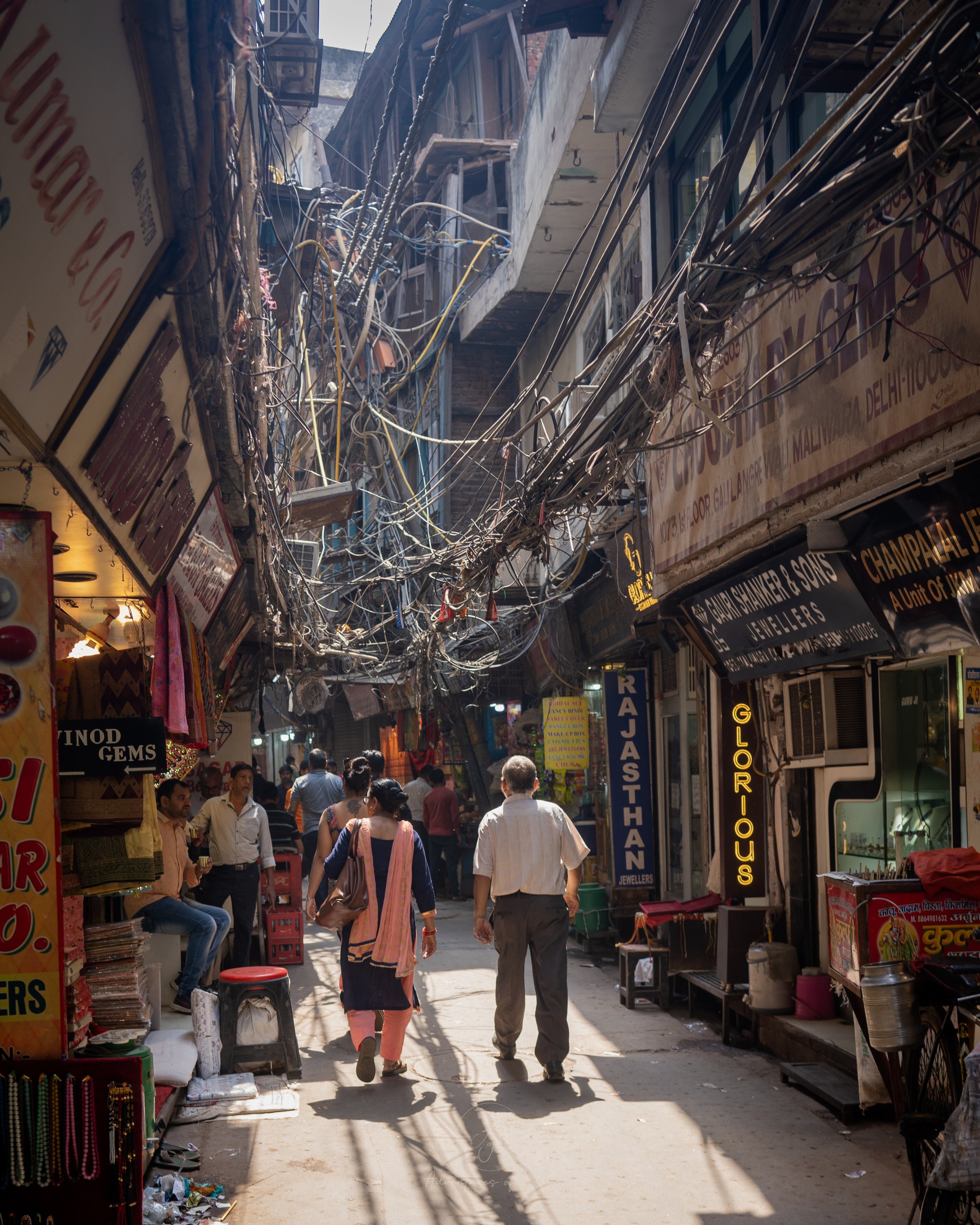
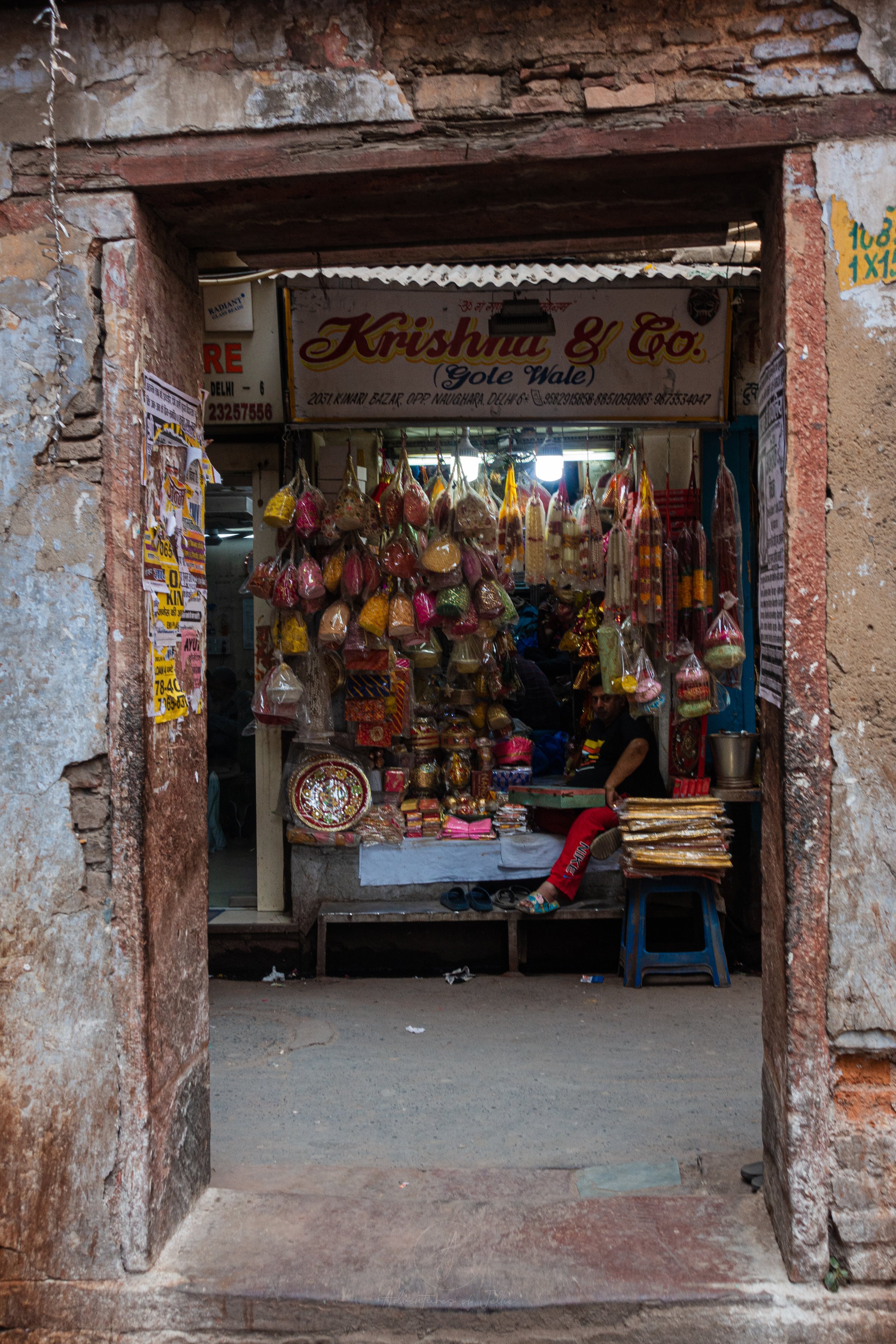
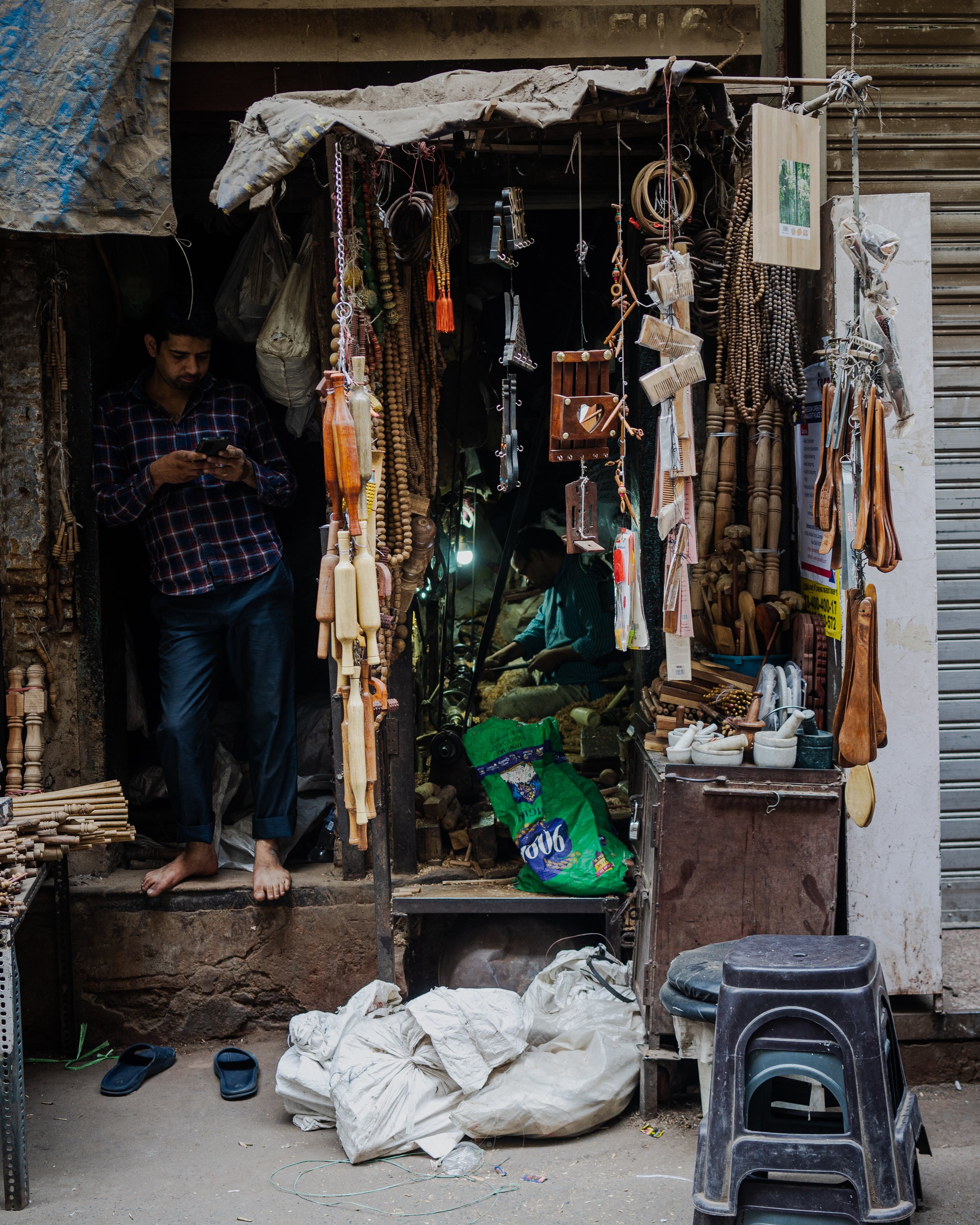
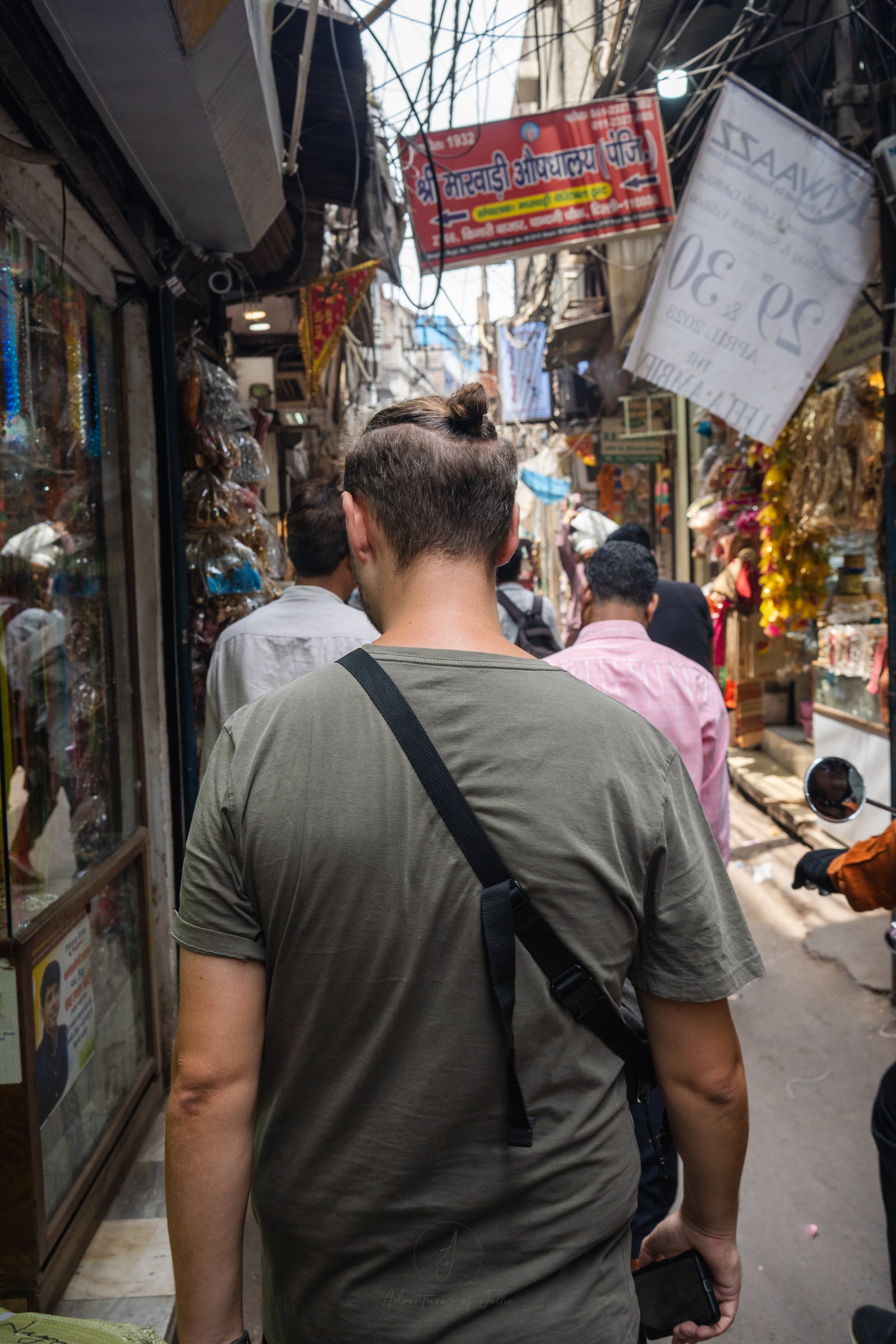
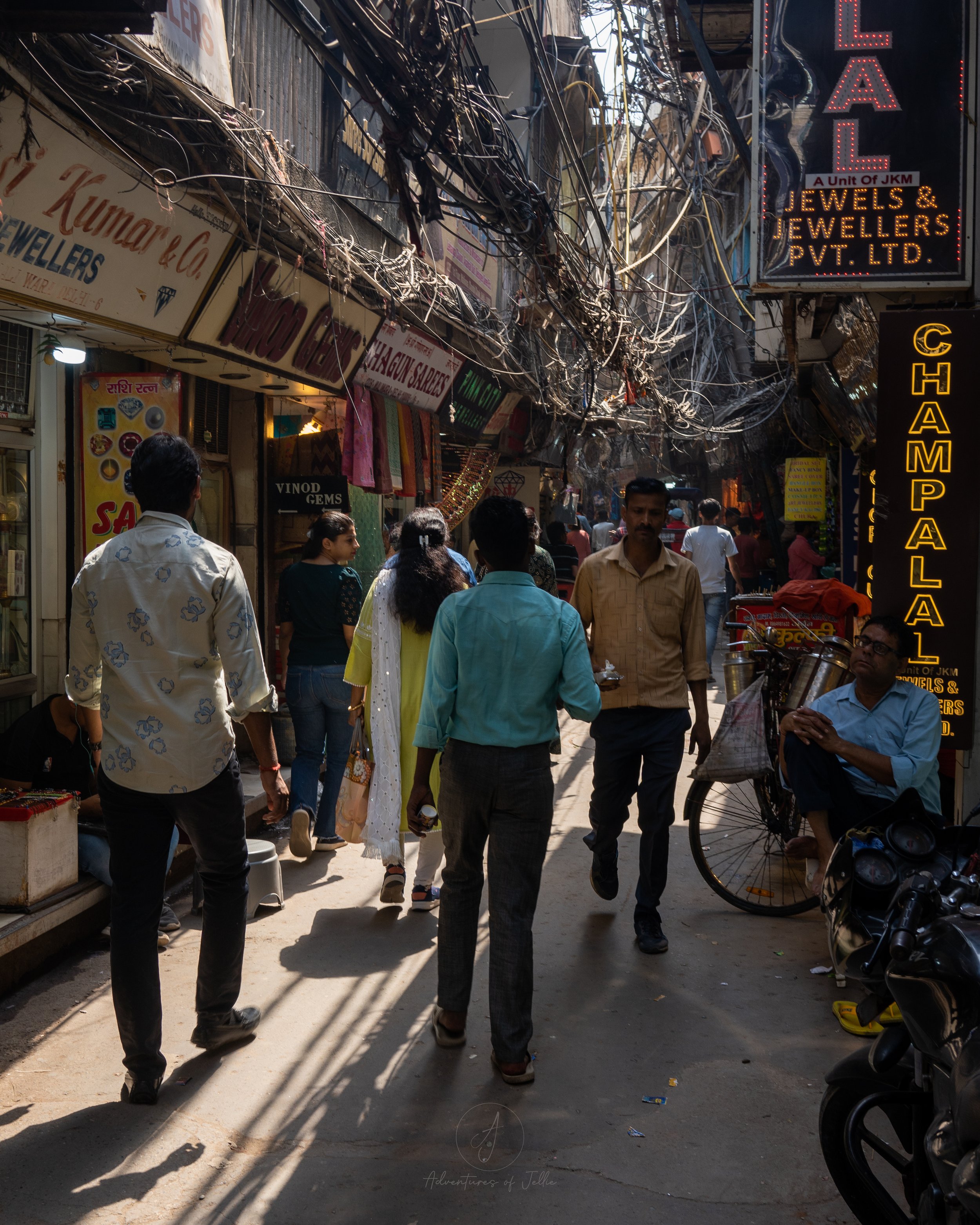

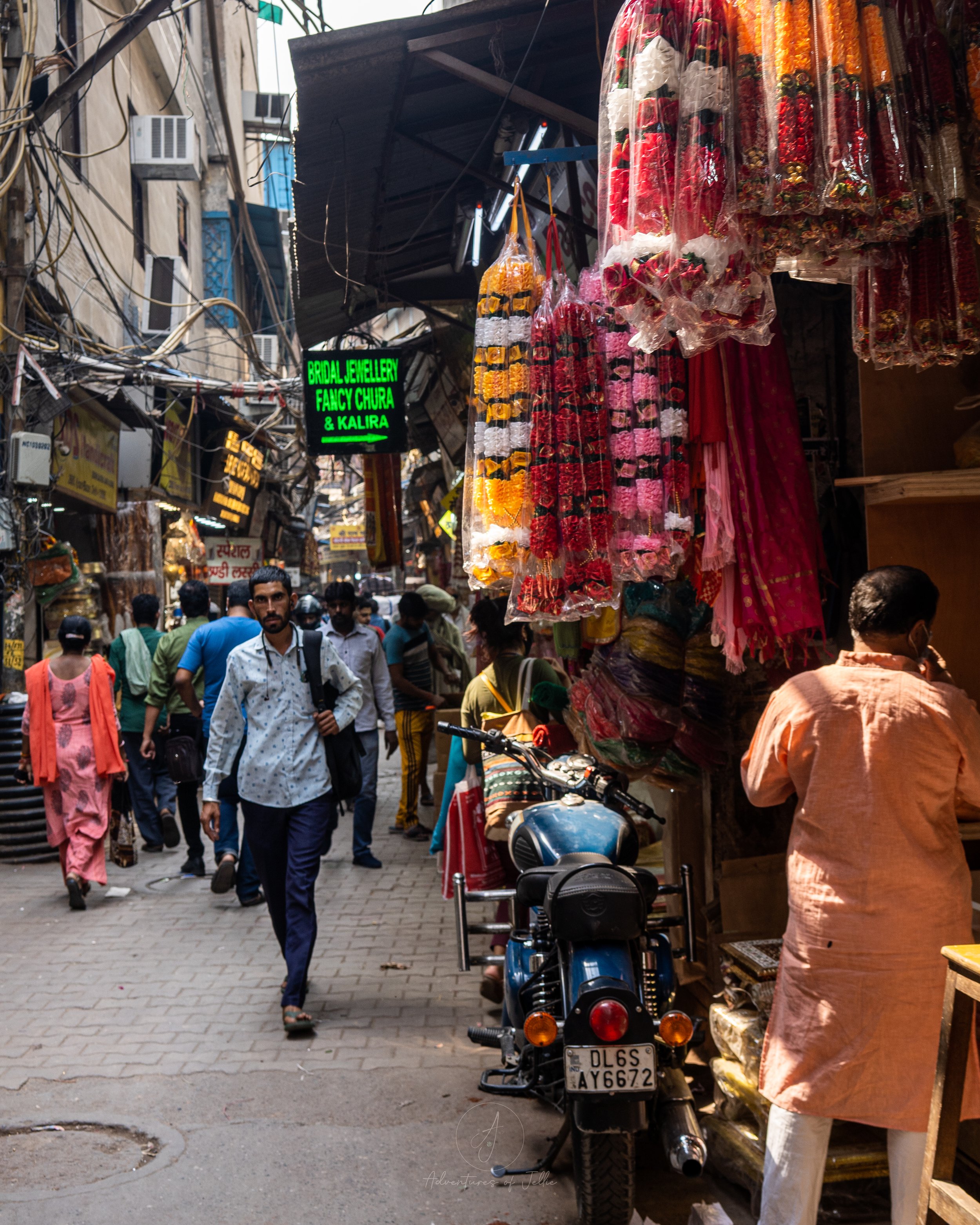
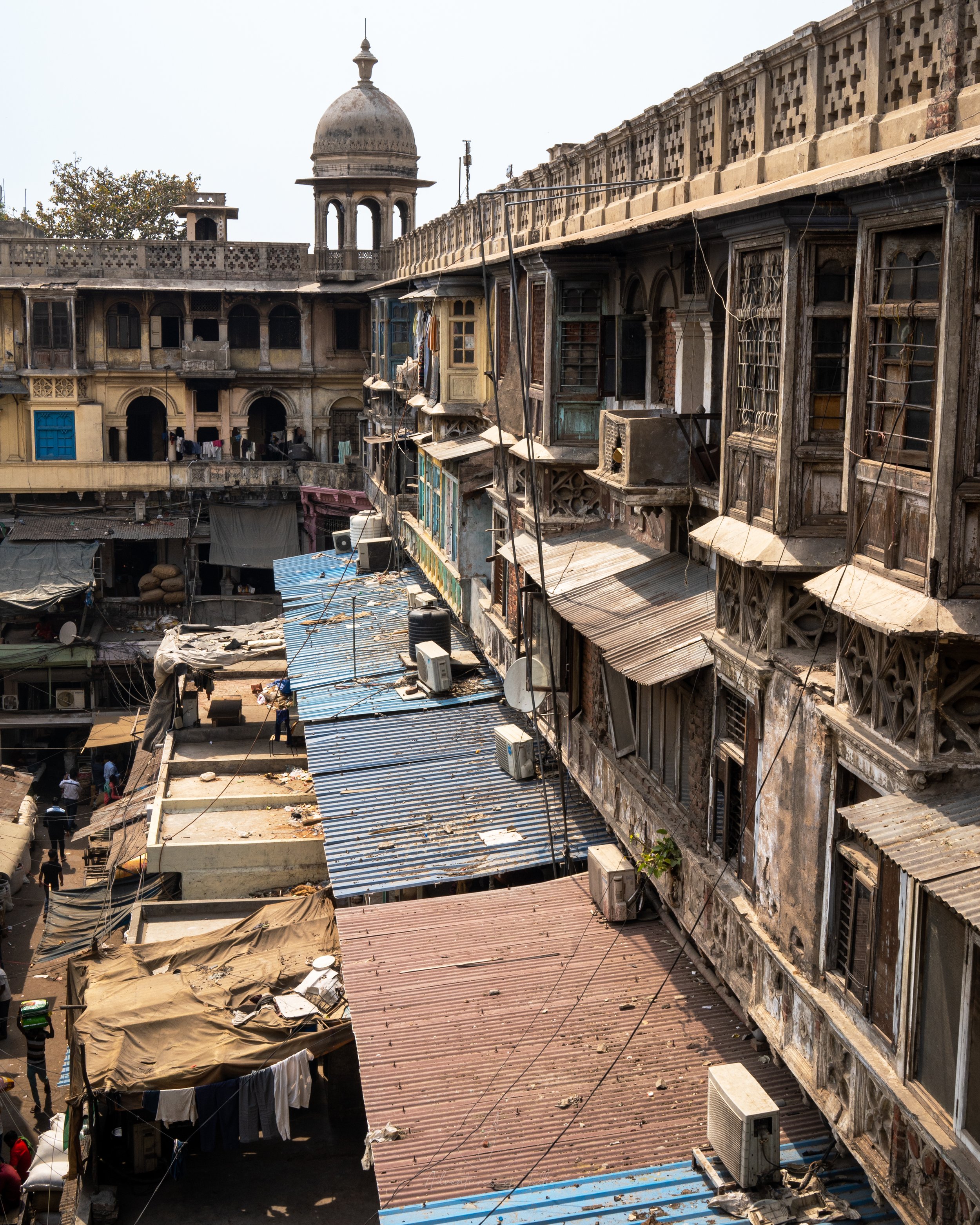
If you’ve found this blog helpful, entertaining or you just fancy supporting us please click the button below!
If you’ve enjoyed reading this article, why not save the pin below?















